
- Comparison Tool

Decentralization Index

Policies Area
Germany - summary.
- Social Policy
- Vocational Training
- Youth and Sport
- Public Health
- Trans-European Networks
- Economic, Social and Territorial Cohesion
- Environment & the Fight against Climate Change
- Water management
- Agriculture
- Immigration and Asylum
- Civil Protection
Toggle menu
- Limited legal role, covering contract law, tax policy, labour market policy and SME policy in relation to the tourism sector
- Practically, due to the relationship between tourism and the other fields with federal competences which have to be taken into account, the position of the federal government plays an important role
- Dialogue with the Länder via the “Bund-Länder-Ausschuss Tourismus" which is led by the Federal Ministry for the Economy. Due to the voluntary nature of participation in this body, there are written division of competences.
- Federal funding for the German National Tourist Board and for projects to enhance the performance of the tourism industry
- Main legislative and policy responsibility, for actual planning, development and direct promotion of tourism
- Dialogue with the Länder via the “Bund-Länder-Ausschuss Tourismus" which is led by the federal ministry. Due to the voluntary nature of participation in this body, there are written division of competences.
- Information and advice service
- Funding tourism research
Intermediate level - Kreise
- Marketing and tourism promotion
Local
- Diverse activities
- Some municipalities cooperate to form tourism associations
- Marketing and tourism promotion
- Local registration
Responsible ministries/bodies
Federal Ministry for Economic Affairs and Energy
Deutsche Zentrale für Tourismus (German Centre for Tourism)
Kahlenborn, W. & Kraack, M. & Carius, A. & Turmann, A. (1997). Umweltpolitik & Tourismuspolitik: Strukturen, Instrumenten und Akteure der Umweltpolitik und anderer tourismusrelevanter Fachpolitiken.
Tourism Policy
Related Information
- Systems of multilevel governance
- Relations with the EU/Representation at EU level
- Subsidiarity
- Bibliography
- Fiscal Powers
- Monitoring reports of the Congress of Local and Regional Authorities (Council of Europe)
An interactive tool with perspective on different dimensions of decentralisation (political, administrative and fiscal) across the 27 EU Member States
Consent management
Please support the Ministry’s public relations work: We need your consent to be able to measure your user activity on our website using etracker. A pseudonymised evaluation of this data by etracker helps us to improve our website. You can revoke your consent at any time for the future. Once you have made your selection, the consent management screen will appear at the bottom of the page. You can use this to stop or to reactivate the statistical evaluation at any point. You can reactivate tracking by dragging the slider in the opposite direction.
Strictly necessary (cannot be deselected)
This website sets temporary session cookies. These are strictly necessary and therefore cannot be deselected. Their sole purpose is to enable you to use the website.
How does etracker work? A script on our website triggers an http request which automatically forwards your IP address and the user agent to etracker GmbH. The first action is that your IP address is automatically shortened. The software then pseudonymises the transmitted data solely in order to identify multiple uses during the session. After seven days, all the attributions to the session are deleted, and your statistical data are entirely anonymised. Etracker is a German company and processes your data exclusively on our behalf on protected servers. The data are not passed on to other third parties. The Federal Ministry for Economic Affairs and Climate Action is responsible for this processing of your data. You can contact our data protection officer at [email protected] . The legal basis is your consent in accordance with section 25(1) of the Act on Data Protection and the Protection of Privacy in Telecommunications and the Telemedia (TTDSG) in conjunction with Article 6(1)a of the General Data Protection Regulation (GDPR) and section 3(1) of the Act to Promote Electronic Government (EGovG). We have ensured that you can withdraw your consent at any time without any negative repercussions and wish to give you full control over the tracking on our website. We also provide a consent management function for this at the bottom of the page. You can use this to control whether etracker is enabled or not.
Consent to the use of JW Player for video streaming
The Ministry also presents its work on this website in the form of videos. These are made available by the provider TV1 using JW Player. Please consent to the transmission of your IP address and other technical data to JW Player and allow JW Player to set cookies on your end device if you wish to view videos on our website. We also provide a consent management function for this at the bottom of the page. You can use this to control whether JW Player is enabled or not.
Consent to the use of Vimeo for streaming live press conferences
We ask for your consent to the live transmission of Ministry press conferences using Vimeo.com. Please consent to the transmission of your IP address and other technical data to Vimeo if you wish to use our livestream video service. We also provide a consent management function for this at the bottom of the page. You can use this to control whether Vimeo is enabled or not.
You can find detailed information on your rights and how we protect your privacy in our privacy policy .
- The Social Market Economy
- European Economic Policy
- Responsibilities as a ministry for European affairs
- After the Brexit referendum: An overview of important information
- Economic Policy Highlights
- Investment Strategy
- Competition Policy
- Securing of Skilled Labour
- Public Procurement
- Regional Policy
- Economic and Cyclical Development
- Modern Industrial Policy
- Industrie 4.0
- Alliance for the "Future of Industry"
- Electric Mobility
- Aerospace Policy
- Maritime Industry
- The Energy Transition
- Renewable Energy
- Grids and Grid Expansion
- Electricity Market of the Future
- Energy Efficiency
- Energy Research
- European and International Energy Policy
- Energy Transition in the Building Sector
Foreign Trade
- Trade Policy
- Promotion of Foreign Trade and Investment
- Export Controls for Military Equipment
- Digitisation
- Innovation Policy
- Cultural and Creative industries
The SME Sector
- Cutting Bureaucracy
- Financing for start-ups, company growth, and innovations
- Tourism Policy
Vocational Training and Careers
- Publications
Information services, help and support
- Tips for Users
- Privacy Policy
- Newsletter "Energiewende direkt"
- State Secretaries
- Tasks and Structure
- Commissioners and Coordinators
- The Ministry's Agencies
- Advisory Boards
Welcome to the Federal Ministry for Economic Affairs and Climate Action
- Getting to the Ministry
Internal hyperlinks for navigation
Article - Tourism Policy
Introduction
Tourism is a major driver of growth and jobs all around the world. In 2018, a total of 1.4 billion people travelled to another country as tourists. This means that the number of international tourists has increased more than fifty-fold since 1950.
In 2018, around 713 million people – a little more than half of the total of 1.4 billion international tourists that year – travelled to Europe. This is an increase of 6% over the previous year. Back in 2011, the World Tourism Organization (UNWTO) forecast that there would be 1.8 billion international tourists in 2030. This figure could actually be reached by the mid-2020s. In line with international usage, the term ‘tourism’ denotes travel for both for leisure and for business.
Important for growth and employment in Germany
The tourism sector is an economic heavyweight and one of the largest employers in Germany. According to a study published by the Federal Ministry for Economic Affairs and Climate Action in 2017, domestic and foreign tourists spent more than €287 billion on goods and services in Germany in 2015. This represents an increase of approximately 8.5% in gross value added from 2012, to more than €105 billion. And this has a positive impact on Germany’s labour market: close to 3 million people worked in the sector in 2015. The boost generated by the tourism sector can also be felt in other industries such as trade, skilled crafts, and agriculture. If one includes upstream input like services at airports, supplies by bakers to hotels and restaurants, or renovation work in hotels, the gross value added figure rises by another €76 billion, and the number of jobs by another 1.25 million, showing the indirect effects of tourism. If tourism continues to expand, the sector will need to keep pace with this and in particular to ensure that there are enough skilled people to work in the business.
Germany as a tourist destination – more popular than ever
Germany is also becoming ever more popular as a tourist destination – a trend that continued in 2018. In 2018, Germany recorded another all-time high in the number of overnight stays for the ninth time in a row. These totalled 477.6 million, up 4% from the previous year. The number of overnight stays by foreign visitors rose by 5%, reaching 87.7 million. Holidays in Germany are also very popular among German nationals. In 2018, these accounted for 389.9 million overnight stays (in hotels, holiday apartments and on camping sites). This is up 4% from the previous year. Surveys indicate that Germany as a travel destination has a market share of around 30%, making it the most popular destination among German nationals by a considerable margin.
Further information about the development of tourism in and to Germany and about activities and measures undertaken by the Federal Government which relate to tourism policy in the 18th legislative term can be found in the Federal Government Report on Tourism Policy , which was adopted by the Federal Cabinet on 17 May 2017.
Tourism – an industry marked by SMEs
The German tourism industry is dominated by small and medium-sized enterprises. According to industry figures, more than 2,500 tour operators, around 4,000 coach companies and just under 10,000 travel agencies are operating in Germany. In addition to this, there are more than 221,000 businesses in the hotel, restaurant and catering industry, including around 44,120 providers of accommodation and 163,400 catering businesses.
Four figures on tourism
million Number of people who travelled to Europe in 2018
million Number of people employed in the tourism industry (2019)
million Number of overnight stays in hotels and hostels in Germany in 2018
% Per cent of overnight stays in Germany were spent by tourists from abroad, the rest by people from Germany (2018).
Objectives and Stakeholders
Creating the right framework for the tourism industry
When it comes to Germany’s federal tourism policy, the objective is to create the right framework for the tourism industry in Germany to flourish. Within the Federal Government, the Federal Ministry for Economic Affairs and Climate Action (BMWK) is responsible for organising tourism policy.
Tourism is a major driver of economic growth in Germany, particularly when it comes to creating jobs and training opportunities, but also for raising and maintaining the attractiveness of Germany’s rural areas. Tourism can boost not just the hotel, restaurant and catering industry, but also a wide range of other economic sectors, such as the retail trade and the entire local supply chain, and it consists mostly of small and medium-sized enterprises. This is why the Federal Government is providing funding to promote Germany’s tourism industry. The development of tourism in the individual regions of Germany falls within the responsibility of the Länder.
Tourism is a cross-cutting policy field that has a bearing on many different issues. These include implementation of the EU Package Travel Directive, dealing with how trade tax is to be applied to certain travel services, and handling visa matters. Other important issues include the minimum wage, working and training conditions and digitisation, including the sharing economy. The Federal Ministry for Economic Affairs and Climate Action is engaged in continuous open dialogue on these questions with the tourism associations, which represent the many different aspects of the German tourism industry.
Commissioner for Tourism
As many aspects of tourism are important for the whole of the country, the Federal Government decided in 2005 to create the office of the Federal Government Commissioner for Tourism. The back then Federal Government Commissioner for Tourism, Thomas Bareiß, Parliamentary State Secretary at the Federal Ministry for Economic Affairs and Climate Action, serves as intermediary between policymakers and the many stakeholders within the tourism industry. He is a contact point for the tourism industry and its associations, and represents the Federal Government on tourism-related concerns in parliament, e.g. in the Bundestag Committee on Tourism (in German) .
National Tourism Strategy
The federal cabinet adopted principles for a national tourism strategy in April 2019. The strategy aims to safeguard the success of Germany as a tourist destination on a long-term basis. Tourism is to be built up as a factor in the economy and the entire sector, in all its diversity, is to be prepared for the future as well as possible.
The national tourism strategy is oriented to three overarching policy goals: Firstly, domestic value added is to be increased, thus fostering economic growth. Secondly, the quality of life of the people living in Germany is to be improved on a lasting basis. Thirdly, tourism is to foster international stability. To achieve these aims, the national tourism strategy is based on a two-stage concept. In the first stage, the Federal Government – assisted by numerous partners from commerce, policy-making and administration – drew up, discussed and fleshed out principles which were adopted by the cabinet. The Federal Government then formulated strategic goals for tourism policy to which future initiatives of all those responsible for tourism policy should be oriented. The Federal Government intends to develop an action plan for the defined fields of action in an intensive dialogue process with specific measures and draft recommendations for action by the stakeholders in the tourism sector. The key principles of the national tourism strategy can be found (in German) here (PDF, 64 KB) .
Advisory Council on Issues of Tourism
The Advisory Council on Issues of Tourism advises the Federal Minister for Economic Affairs and Climate Action and the Federal Government Commissioner for Tourism on issues relating to tourism. It consists of representatives from enterprises and associations of the tourism industry, transport companies, destinations and academia. Providing its broad range of expertise, it supports the Ministry’s decision-making process. The aim is to strengthen tourism in Germany and to improve the framework conditions for this purpose.
Federal Government Centre of Excellence for Tourism
In order to further strengthen government support for the tourism industry, the Federal Ministry for Economic Affairs and Climate Action has established a Federal Government Centre of Excellence for Tourism. The Centre of Excellence mainly supports the operational implementation of the Federal Government’s tourism policy objectives by monitoring and analysing economic, technical and social developments in tourism and in the sector. An important part of its work is the special module entitled Tourism 2030, which is seeing the Centre join together with the various players in the industry and with academics to look at long-term scenarios and prospects for tourism in Germany. The Centre of Excellence has an advisory board as a “sparring partner” and a supervisory body whose membership includes representatives of the tourism associations of national significance.
The LIFT funding programme
In the context of the programme entitled “enhancing performance & promoting innovation in the tourism sector” (LIFT), the Federal Ministry for Economic Affairs and Climate Action is as from 2019 providing funding for innovative project ideas that serve as a model to make small and medium-sized enterprises in the tourism sector fit for the future. The funding totalling €1.5 million serves to provide fresh impetus from within the sector, without putting a special emphasis on any specific issues or target groups. The Federal Government Centre of Excellence for Tourism selects particularly suitable projects and provides advice as to the implementation. You can find further information and details of the funding terms (in German) on the website of the Centre of Excellence for Tourism at Kompetenzzentrum Tourismus .
Marketing Germany as a travel destination
In order to ensure that the German tourism industry continues to thrive, it is important to market Germany as a tourist destination abroad. This task is undertaken by the German National Tourist Board (GNTB) , which is located in Frankfurt. The Federal Ministry for Economic Affairs and Climate Action currently provides around €34 million in annual funding to the DZT. The DZT also receives funding from its current base of 67 members and 16 sponsors, which include companies within the tourism industry, marketing organisations and important tourism associations.
The goal is to attract an even greater number of foreign visitors to Germany and ensure that tourism will make an even larger contribution to the country’s income and job market. In order to achieve this goal, the German National Tourist Board runs offices around the world, where staff work together with local tour operators and local media in order to market Germany as a tourist destination. The DZT conducts in-depth market analyses and studies which help it to anticipate new trends and adapt its marketing strategies in a targeted manner to the needs of foreign holidaymakers and business travellers. The DZT also coordinates closely with a large number of German tourism companies in order to position Germany as a top tourist destination, right around the globe. The German National Tourist Board also showcases Germany as a travel destination among tourism industry professionals around the world, organising a wide range of different events and campaigns, and providing many different services. These include participation in international tourism trade fairs, workshops and media events, which together serve as an important platform for marketing Germany as a travel destination. Travellers and organisations interested in finding out more can go to the DZT’s website and download special apps or join social networks in order to obtain information about travel destinations, programmes and tourist events taking place in Germany. This information is available in several languages. In 2018, the DZT concentrated its marketing activities on the central theme of ‘Culinary Germany’. In 2019, tourism promotion is centring upon the centenary of the founding of the Bauhaus design movement. 30 years after the Wall came down, the increased range of tourism services throughout Germany will also be a key focus. In 2020, the DZT’s campaigns will be devoted to the 250th anniversary of Beethoven’s birth, nature in Germany and 30 years of German unity.
Infographics
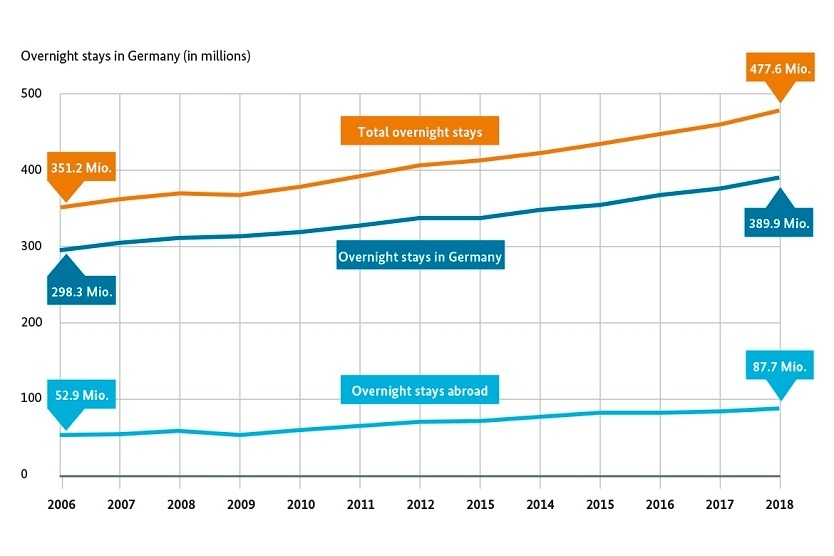
© German Federal Statistics Office
Infographics - The Tourism Industry
Infographics: Overall demand in the German tourism industry
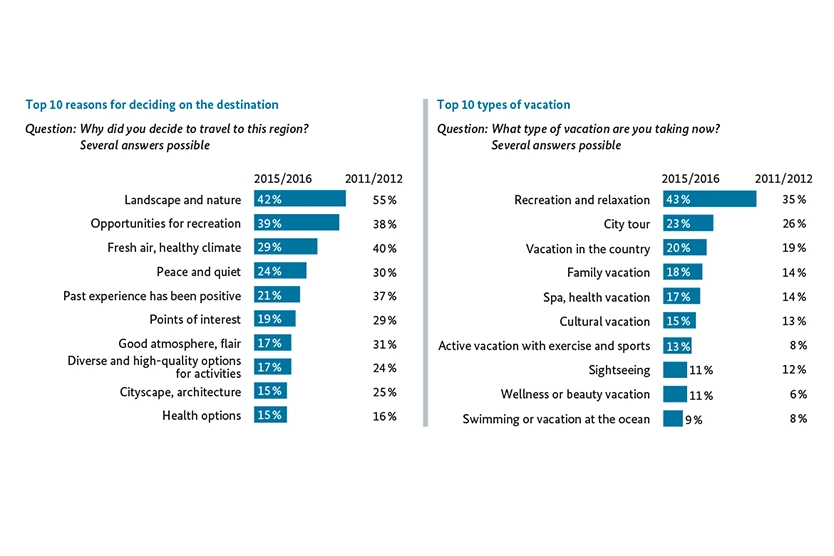
© dwif, Quality Monitor Survey of the German Tourism Industry 2011/2012 and 2015/2016
Infographics: Rationale for decisions regarding travel destination and type (German travelers)
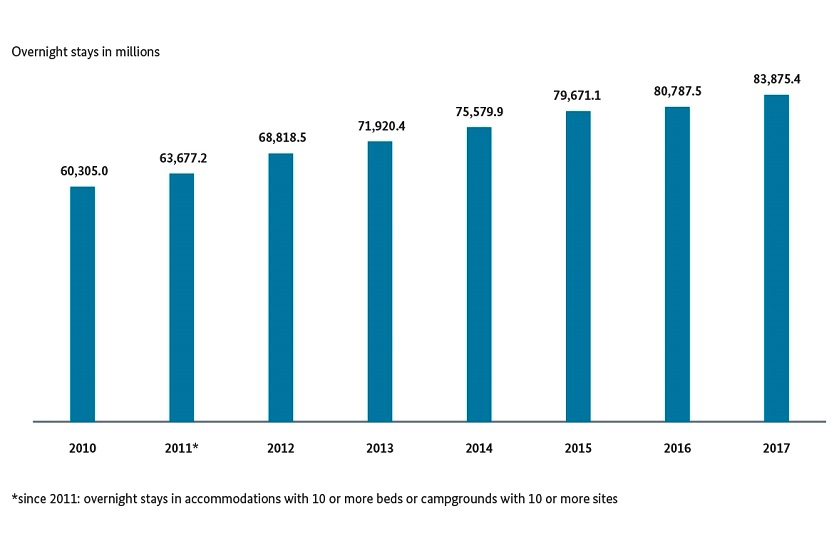
Infographics: Trend in overnight stays of foreign visitors in German accommodations since 2010
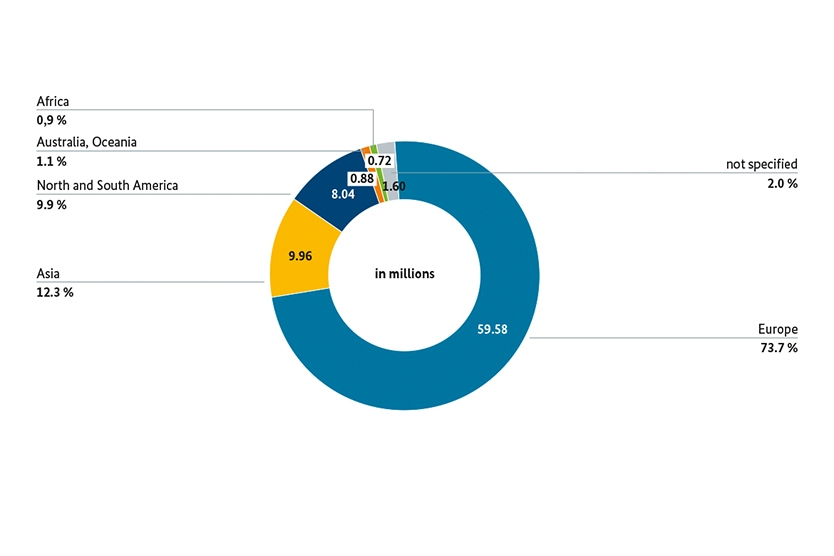
© German Federal Statistics Ofce, overnight stays in accommodations with 10 or more beds or campgrounds with 10 or more sites
Infographics: Overnight stays of foreign tourists in Germany in 2016
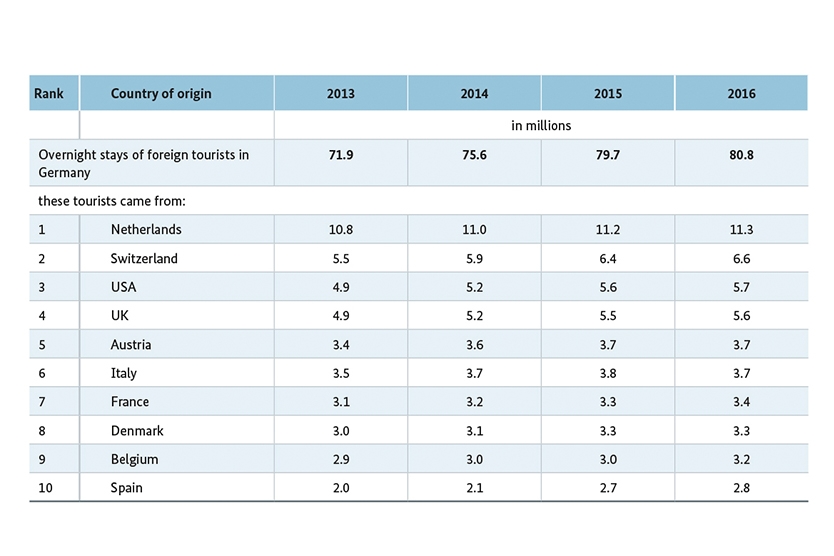
© German Federal Statistics Office, overnight stays in accommodations with 10 or more beds or campgrounds with 10 or more sites, ranking of source markets according to 2016 data
Infographics: Top 10 countries of origin for foreign tourists in Germany 2013–2016
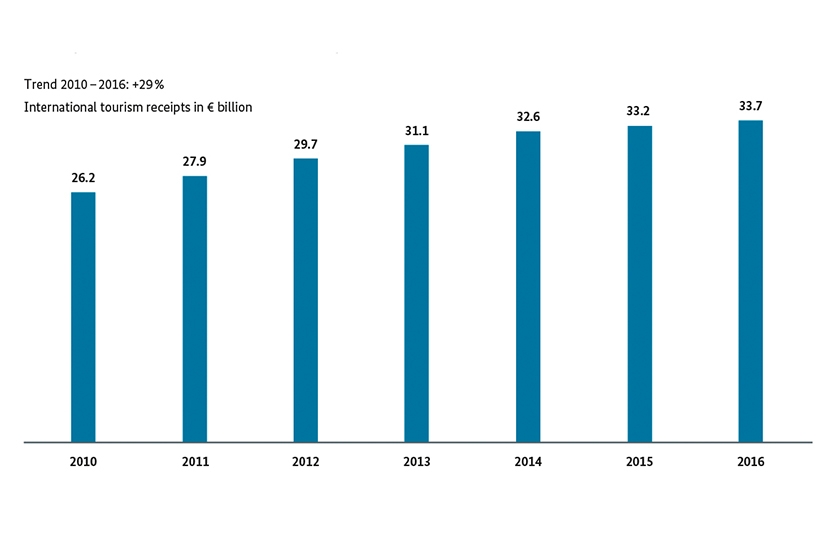
© Deutsche Bundesbank, 2017
Infographics: Development of international tourism receipts 2010 – 2016
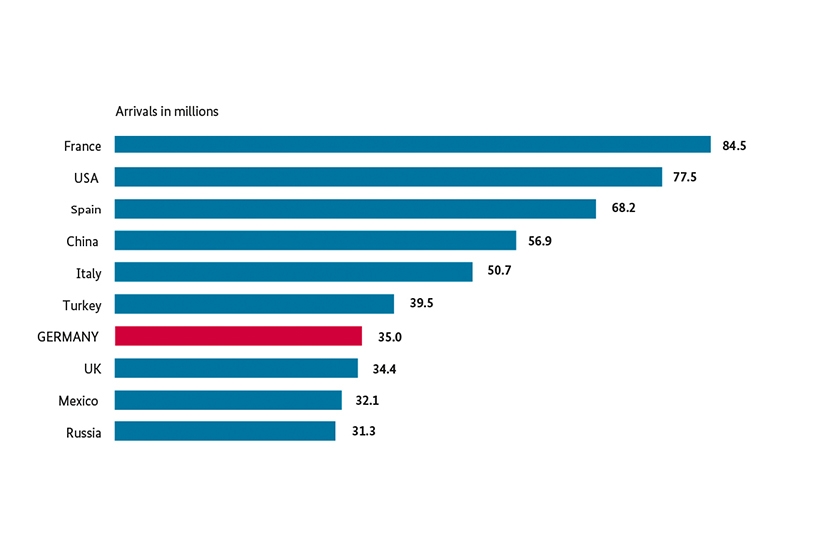
© UNWTO World Tourism Barometer November 2016
Infographics: Top 10 destinations by international tourist arrivals in 2015
Priorities for Germany’s tourism policy
A large variety of tourist attractions combined with social responsibility
Whether it’s discovering the country’s rich cultural heritage or relaxing somewhere in the heart of nature, Germany offers something for everyone. This is what makes tourism a key sector for qualitative growth: providing employment and income for people of many different origins and skills backgrounds, in all parts of Germany.
The Federal Government pursues a policy of qualitative growth. One of the aims here is for as many people and regions as possible to share in value creation and prosperity. This is why – in addition to growth targets – the Government also follows structural and social policy goals in tourism policy. In the 18th legislative term, a particular focus was laid on strengthening tourism in the rural regions by better linking cultural highlights with tourist services. These areas, although often structurally weak, are generally rich in culture. The Federal Government is also actively committed to promoting accessibility in tourism and is supporting work to create a unified national certification system for accessible travel. In Germany, the number of overnight stays made by tourists in the 18th and the early 19th legislative terms developed well. Whilst Germany as a tourist destination is becoming ever more popular, there are still many opportunities to be grasped and challenges to be mastered – these include issues such as sustainability and social responsibility, and also how to find and retain skilled staff. These are some of the key priorities that the Federal Ministry for Economic Affairs and Climate Action is addressing in its tourism policy.
International cooperation
Cross-border dialogue
The Federal Ministry for Economic Affairs and Climate Action represents Germany on European and international tourism issues in many different arenas, including within the European Union, in the UNWTO, the OECD and in bilateral relations with other countries.
This means sharing best practice examples on tourism policy and developing measures for boosting competitiveness, sustainability and social responsibility. One example is the European Capitals of Smart Tourism competition in 2019 and 2020.
Since the entry into force of the Lisbon Treaty in 2009 (Art. 195), the European Union (EU) has been given the power to adopt tourism policy measures that supplement the measures taken by the EU Member States. At present, the European Commission is focusing on the following priorities in the field of tourism policy:
- improving competitiveness (by enhancing the legal framework and reducing red tape, etc.) and providing better access to capital (by providing loans/guarantees, but also by attracting foreign investment, etc.);
- improving quality, sustainability, accessibility and the digitisation of tourism;
- improving skills development (initial and further training/securing skilled labour) and the mobility of employees;
- promoting Europe as a tourist destination, in particular by marketing trans-regional products (particularly to China, with whom the EU organised a Tourism Year in 2018).
To find out more about European tourism policy, please click here (in German) .
OECD: International cooperation
The Federal Ministry for Economic Affairs and Climate Action represents Germany on the OECD Tourism Committee. Members of this body share information and positions on current issues in tourism, and discuss best practice examples from tourism policy in the various OECD Member States. The discussion also incorporates all tourism-related issues as well as analyses conducted by the OECD in other areas to the extent that they are relevant to tourism, such as climate change, green growth, sustainability, arts and culture, deregulation, digitalisation and the sharing economy, travel safety and security, infrastructure, etc. This also benefits the tourism policy of the Federal Government. Find out more .
The World Tourism Organization – UNWTO
The World Tourism Organization (UNWTO) is a specialised agency of the United Nations, headquartered in Madrid. The task of the World Tourism Organization is to “promote and develop tourism with a view to contributing to economic development, international understanding, peace, prosperity and universal respect for, and observance of, human rights and fundamental freedoms for all without distinction as to race, gender, language and religion”. As it does so, the UNWTO pays particular attention to the interests of developing countries in ensuring broad-based tourism development that is also sustainable. Find out more.
T20 Tourism Ministers' Meeting
The T20 brings together the tourism ministers from major developed countries and emerging economies (G20). This forum aims at highlighting the contribution tourism can make to the economic development of the G20 countries and at advocating a tourism-friendly economic policy. At the 2018 T20 meeting in Argentina, the focus was on “tourism’s leading role in sustainable development: a driver for employment”. In a joint statement, the ministers called on the G20 states to create the conditions for more jobs and better working conditions in tourism, and agreed to continue their intensive cooperation.
The T20 meeting is held in cooperation with the World Tourism Organization UNWTO. The T20 initiative was launched in 2009 by various G20 UNWTO members, and was initially organised outside the formal G20 agenda. In 2019, the meeting of tourism ministers in Japan is taking place in the context of the official G20 format for the first time.
Further information
Article - The Tourism Industry
Article: Doing Business in the Travel Industry
Article: Special regulations for incoming tourism from the People’s Republic of China
01/03/2017 - Publication - Tourism Policy
Publication: Federal Government Report on Tourism Policy
18th legislative term – short version
External sites -
External sites: German National Tourist Board (GNTB)
External sites: Aktuelle Statistiken zur Tourismuswirtschaft des Statistischen Bundesamts

Related topics
- German National Tourist Board GNTB
- Plan Your Business Event with the GCB's Network
- GCB Strategic Partners
- Deutsche Bahn
- Deutsche Lufthansa
- Strategic Exhibition Partner: IMEX
The German National Tourist Board (GNTB) is Germany’s national tourism organisation. It works on behalf of the Federal Ministry for Economic Affairs and Energy (BMWi) to represent Germany as a tourist destination and is funded by the Ministry in accordance with a decision taken by the German Bundestag. Working closely with the German travel industry and private-sector partners and trade associations, the GNTB develops strategies and marketing campaigns to further enhance the positive image of Germany’s regions as a travel destination internationally and to encourage tourists to visit the country.

The GNTB markets Germany around the world as a destination for both holiday tourism and business travel. The latter includes not only traditional business travel but also visits to trade fairs and trips for meetings, incentives, conferences and events (MICE). The GNTB works hand in hand with the German Convention Bureau to market Germany as a MICE location. This strategic partnership is supported by the GNTB’s international network of 27 foreign representative offices, which cover more than 40 markets.
The GNTB has a three-pronged recovery strategy for overcoming the challenges of the COVID-19 pandemic:
- Raising awareness of the Destination Germany brand and enhancing the brand profile
- Supporting the travel industry, which is dominated by small and medium-sized businesses, through relationship management and the sharing of knowledge
- Developing evidence-based action plans on the basis of targeted market research and ongoing analysis of the impact of coronavirus.
Business travel: a key pillar for inbound tourism to Germany
The business travel market is a key asset for Germany’s inbound tourism industry. Almost one quarter of the volume of all inbound travel from Europe to Germany is generated by business travellers – a higher proportion than in any other European country. When the COVID-19 pandemic hit, demand in the traditional business travel segment had already been in decline for a number of years, whereas the market share of promotable business trips had been steadily increasing up to that point. But even after the outbreak of the COVID-19 pandemic and the associated disruption for the MICE market, over half of all inbound business trips to Germany were classed as promotable.
Focus on digitalisation and sustainability
The GNTB promotes forward-looking and sustainable tourism in line with the objectives of the German government. Sustainability is a core overarching topic for the GNTB and one with which it engages strategically across all areas of the organisation. To reflect the global shift in travellers’ values towards greater social and environmental responsibility, the GNTB is positioning Germany as a sustainable and inclusive destination in the international travel market.
When it comes to the digital transformation, the GNTB has become a pioneer in the use of immersive technologies, conversational interfaces, and artificial intelligence applications. To ensure that tourism offerings are visible on AI-based marketing platforms, the GNTB coordinates the German tourism industry’s open-data project, which aims to develop a tourism knowledge graph.
Innovation is key to the future of promotable business travel
Digitalisation and internationalisation are the key factors in the strategic partnership between the GNTB and the GCB. Both organizations are working hard to develop smart MICE formats and to incorporate them into the structure and international marketing of Germany’s business travel offering.
In this area
More from the categories.
- Business meetings destination Germany
- Information for GCB members
- Press and general public
- Network partners
- Sustainability
- Tips for event planners
Path to page
- Members area
- Change language
- #MeetConnectDiscover
- #SafeBusinessTrips
- Impact of Coronavirus on Europe’s Convention Sector
- The GCB's Members
- H World International
- darmstadtium
- Frankfurt Airport Marriott Hotel I Sheraton Frankfurt Airport Hotel & Conference Center
- Tourismus-Agentur Schleswig-Holstein
- Thüringer Tourismus GmbH
- Business Partners
- EVVC European Association of Event Centres e.V.
- VDVO - Association of German Event Planners
- Germany.Expertise
- Destination Germany
- GCB Event Platform
- Pre-IMEX Educational Trip Düsseldorf
- Post-IMEX Educational Trip Dresden
- IMEX America
- Exhibitor Information 2024
- Business Boulevard 2024 - German Booth
- 2024: Business Events in a Transformative Era
- 2023: Creating Meaningful Events in Challenging Times
- Statements Research Partners 2022
- 2021: Challenges of the Post-Corona Era
- 2019/20: The Future Role and Purpose of Events
- Research Phase 2017/18
- Research Phase 2015/16
- Meeting- & EventBarometer
- Thought Leader Panel
- Response Room
- BOCOM - Experience Borderless Communication
- Platform Economy
- Destination Europe
- Meetings and Conventions 2030
- Net Zero Carbon Events
- right and fair
- Green Globe
- Diversity, Equity & Inclusion
- Compliance System
- Next Stop Germany
- MICE Think Tank
- Meetings - Hands On
- Let's Talk GCB
- Careers at GCB
- Marketing Committee
- Information for Members and Interested Parties
- Our Members
- Mitgliederversammlung
- Press releases archive
- Video Library
- Image Gallery
- Newsletter Archive
Not found suitable content yet? Use our search function to browse the entire GCB website for your keywords.
Login to member's area
Direct access to exclusive information for our members.
You don't have a login yet or are interested in GCB membership? Contact us!
Switch language
You are currently viewing our page in English. But just one click takes you to our German content.
前往德国会议促进局(GCB)中文网站
您正在浏览德国会议促进局(GCB)的德文网站。您只需点击一下就可以访问我们的中文页面。(DE)
Share this content
Do you like our content? Then share it with others - easily via social media or email.
GCB in English
Unfortunately, this page is only available in German at the moment. You can find information about GCB in English at the english gcb site .
GCB auf Deutsch
Leider ist diese Seite zur Zeit nur in englischer Sprache verfügbar. Informationen über das GCB in deutscher Sprache finden Sie unter der deutschen GCB-Website .

- Brand Resources
- Economic Impact
- WTTC Research Hub
- Insights & Publications
- Knowledge Partners
- Data Enquiries
- Sustainability Hub
- Hotel Sustainability Basics
- Nature Positive Travel & Tourism
- Social Impact
- Community Conscious Travel
- Security & Travel Facilitation
- Women Empowerment
- Destination Spotlight - SLO CAL
- SafeTravels: Global Protocols & Stamp
- SafeTravels Stamp Application
- Governments
- Global Summit
- Upcoming Events
- Event Photography
- Hosting a Summit
- Event Enquiries
- Our Members
- Our Associates Community
- Membership Benefits
- Enquire About Membership
- Sponsors & Partners
- Press Releases
- Press Enquiries
- Consumer Travel Blog
- ONEin330Million Campaign
- Reunite Campaign
WTTC Predicts Germany’s Travel & Tourism Sector to Rebound to 95% of Pre-pandemic Levels

Travel & Tourism contributes one in eight jobs International visitor spend up more than 60%
London, UK: The World Travel & Tourism Council’s ( WTTC ) 2023 Economic Impact Research (EIR) today reveals Germany’s Travel & Tourism sector is recovering at pace to recover to within 95% of pre-pandemic levels. The sector is set to contribute €355BN to the national economy this year, getting to within 95% of the 2019 highpoint, and representing 9.3% of the economy. WTTC is also forecasting that the sector will create more than 168,000 jobs this year, recovering most of the jobs lost due to the COVID 19 pandemic to reach 5.6MN. A look back on last year Last year, the Travel & Tourism sector’s GDP contribution grew by 43.4% to reach more than €338BN, representing 8.8% of the economy, edging closer to the 2019 high of €374BN. Last year the sector also created 550,000 more jobs from the previous year to reach 5.4MN jobs nationally – one in eight jobs across Germany. The sector has now recovered over 50% of the 1MN jobs lost during the pandemic. Last year also saw the return of international travellers heading to Germany with spending from overseas visitors growing 61% to reach almost €31BN. Domestic visitor spend is within touching distance of the pre-pandemic level of €307.8BN and is currently €304.4BN, a year-on-year increase of 49%.
Julia Simpson, WTTC President & CEO, said: “The Travel & Tourism sector in Germany is making a strong recovery. It will contribute €355BN to the German economy this year and employ one in eight jobs across the country. “Germany is forecast to remain the fifth most popular tourism destination in Europe over the next decade, demonstrating its enduring appeal.” What does the next decade look like? The global tourism body is forecasting that the sector will grow its GDP contribution to more than €440BN by 2033, 10.3% of the overall economy and will employ almost 6.1MN people across the country, with one in seven Germans working in the sector. Europe In 2022, the European Travel & Tourism sector contributed €1.9TN to the regional economy, just 7% below the 2019 peak. WTTC forecasts the region’s GDP contribution from the sector will reach more than €2TN in 2023 - within touching distance of the 2019 highpoint. The sector employed almost 35MN people across the region in 2022, an increase of 2.9MN from the previous year but still 3.2MN behind pre-pandemic levels. WTTC forecasts the sector will fully recover the jobs lost during the pandemic by the end of 2024. Download Press Release
.jpg)
Reconoce el WTTC la labor de los empresarios turísticos de Quintana Roo
.jpg)
Se reúne WTTC con el máximo organismo empresarial de México
.jpg)
Contribuirá el sector de viajes y turismo con más de 264 mil millones de dólares al PIB de México durante 2024: WTTC

We've detected unusual activity from your computer network
To continue, please click the box below to let us know you're not a robot.
Why did this happen?
Please make sure your browser supports JavaScript and cookies and that you are not blocking them from loading. For more information you can review our Terms of Service and Cookie Policy .
For inquiries related to this message please contact our support team and provide the reference ID below.
What are you looking for?
Coronavirus (covid-19).
Important information
Frequently Asked Questions
How can i receive a digital covid certificate/qr code.
No information is currently available about how those with a foreign vaccine card (e.g. from the US) can receive a digital COVID certificate which is recognized in Europe. Talks are currently underway regarding recognition of international vaccinations (i.e. received outside the EU ). As soon as such information becomes available, we will communicate on this site.
- Top of page
Destination Germany
Would you like to travel to Germany as a tourist? Here you’ll find all the important information you need for an unforgettable stay.
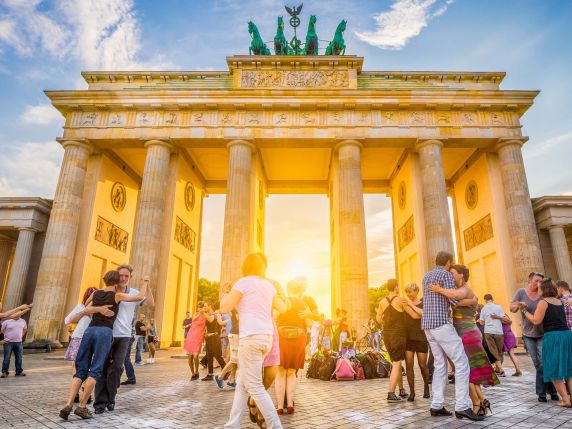
Whether you love nature or history, mountains or the sea, Germany has something to offer for everyone. From majestic castles set amid picturesque landscapes to the lively streets of Berlin, there are countless hidden treasures to discover in the country. Here you will find valuable information about popular destinations, cultural highlights, local traditions and delicious dishes along with practical travel tips. Get ready for a journey through Germany to explore fascinating cities, breathtaking mountain landscapes and intriguing UNESCO World Heritage Sites.
Topics on this page
Entry requirements, how can i get about in the country, travelling on a budget, what do i need to know before the trip, food and drink, the most attractive towns and cities, outdoor excursions, history and technology, history up close, unesco world heritage, the great outdoors, where can i stay the night, germany from a distinctive perspective, germany from a digital perspective.
We have sent you a confirmation email. Please confirm your email address so that we can send you our newsletter in the future.
An error has occurred. Please try again later.
To get you in the mood, we’ve put together a summary of some of Germany’s magical spots, magnificent natural attractions and a few ideas as to what you might like to do on your trip to Germany:

What are the requirements for tourists entering Germany?
Tourists from EU countries in the Schengen area and from many other countries can enter without any further formalities. All other travellers need a tourist visa for a 90-day stay: the type C Schengen visa. Check this list issued by the German Foreign Ministry Auswärtiges Amt to find out if you need a visa:
https://www.auswaertiges-amt.de/en/visa-service/-/231148
You can obtain a visa from the German embassy or consulate in your country. It will also provide you with details of any requirements that apply.
How can I travel in Germany?
Germany is well-known for its motorways . They criss-cross the country in all directions. With the exception of a few islands, you can get to virtually every point of interest in Germany by car. Travelling by train in Germany is very convenient, too: the local and long-distance public transport network has trains and buses that serve virtually the entire country. The major cities and their surrounding areas in particular offer excellent transportation links. One convenient option for travel between larger towns and cities is that of the long-distance buses. There is also domestic air traffic – though given that Germany is not overly extensive in size, more ecofriendly forms of travel are available.
Here you will find tips for travelling in Germany:

Bonus tip: how can I travel in Germany on a limited budget?
Travelling costs money, and even though there are a lot of countries that are more expensive than Germany, it is certainly not one of the cheapest holiday destinations. The longer you want to spend exploring Germany, the more this applies, of course: travel, accommodation, food and drink are necessary expenses. One option is to earn the cost of your trip in Germany itself while you are there.
Find out all about work and travel in Germany:

What are the most important things I need to know when travelling to Germany?
Germany is made up of 16 federal states , but this won’t affect you in terms of tourist travel. There are no noticeable borders between the states and the same laws apply everywhere throughout the country. Germany has a nationwide system of healthcare consisting of general practitioners and hospitals. In order to keep costs low in the event of illness or accident, tourists are advised to take out travel health insurance for the duration of their visit to Germany. All common means of payment are accepted in Germany, though paying with cash is still widespread, especially in the case of small amounts. Food in Germany is international: Italian, Turkish and Asian cuisine is to be found practically everywhere. German cuisine with all its specialities is an option too, of course.

What can I eat and drink when I visit Germany?
The restaurant landscape in Germany is practically unlimited and highly diverse. In big cities in particular it is possible to find almost every type of international cuisine, often in gourmet quality, too. Virtually every town in Germany has a pizzeria, a kebab restaurant or a Chinese restaurant serving good food that is reasonably priced. But tourists will want to try the country’s own typical dishes and drinks, too. Some dishes require a little tolerance, unlike perhaps the most common German drinks such as beer and wine. When it comes to beer and wine, it’s always a good idea to try regional specialities.

What places should I visit in Germany?
There are hundreds of worthwhile destinations in Germany. Here you will find the most popular places for tourists from abroad to visit in Germany:
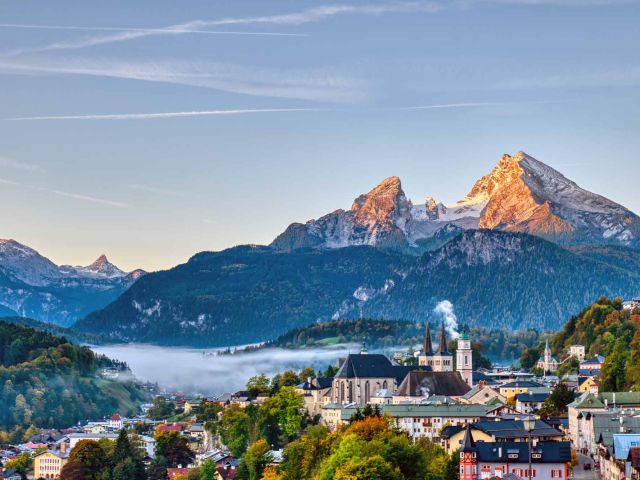
Everything you need to know about the most attractive German towns and cities
But this is only a small selection of course. You might be asking yourself: where do I start my trip to Germany? What are the most frequently visited towns and cities in Germany ? Maybe you’d like to get to know the big German cities ? Hamburg, the port city on the North Sea, Berlin, the German capital, Leipzig, the cultural centre in the east, or Cologne, the city with the famous cathedral? Frankfurt, the city of banks and museums? Or Munich, home to the Oktoberfest, situated on the edge of the Alps? Each of these cities has a long and fascinating history, even dating back to Roman times in some cases.
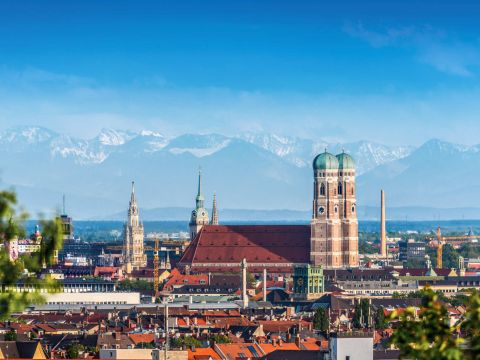
Our bonus tip: “Berlin for free”
You don’t necessarily have to spend a lot of money if you want to visit Germany. Here we have compiled a special set of tips for those who’d like to get to know Berlin (almost) for free:

Everything you need to know for a trip to the countryside in Germany
Germany has a rich variety of landscapes: the islands in the North Sea and Baltic Sea , extensive plains in the north rising to the lower mountain ranges, and then Germany’s highest point in the far south – the Zugspitze in the picturesque Alps. In all these regions you will find unique and stunning landscapes, romantic river valleys, majestic mountains such as the Brocken in the Harz Mountains or the Feldberg in the legendary Black Forest – and there are even enchanted primeval forests, too.

The different landscapes provide habitats for numerous different animal species. If you are interested in wild animals, this is the right place for you:
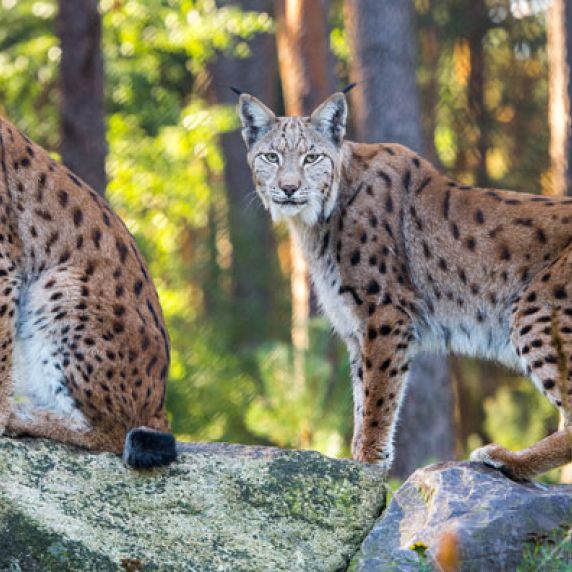
Everything you need to know about cultural and historical highlights on your trip to Germany
No one can visit the land of Goethe, Bach and Beethoven without at least encountering in some form the mark left by these and other great artists – or indeed hearing their works. Germany is the country with the most symphony orchestras and opera houses. The Berlin Philharmonic is considered one of the best orchestras in the world, and more than a third of the world’s opera performances take place in Germany. In Berlin alone there are three opera houses, the Semperoper in Dresden is world-famous, too, and then of course there is the Festspielhaus in Bayreuth, where only works by Richard Wagner are performed. Popular music has an equally important role to play: with festivals such as “Rock am Ring” at the Nürburgring motor racing track and concerts ranging from local bands to international superstars, there is something on offer to suit every taste.

Great art treasures in impressive museums
In Germany, cultural education is seen as a responsibility of the public sector, which is why many museums receive funding from the state. This is another reason why the country has countless museums that many millions of people visit every year. Berlin has an entire museum island – a must-see on any visit to the capital. The Alte Pinakothek in Munich, the Städel Museum in Frankfurt, Museum Ludwig and the Wallraff-Richartz Museum in Cologne, the Staatsgalerie in Stuttgart and the Gemäldegalerie Alte Meister in Dresden – the list of outstanding exhibition venues is virtually endless. The advantage from your point of view when travelling to Germany: it’s usually not far to go to the nearest major museum.

Spectacular presentations of history and technology
Museums are not only dedicated to the fine arts, of course. The largest technology museum of its kind in the world is in Munich: the Deutsches Museum. 1.5 million people visit it every year. Another spectacular place to see is the Sinsheim Museum of Technology, where a real Concorde is on display – still the fastest passenger aircraft ever. Anyone visiting Frankfurt am Main who is interested in natural history should be sure not to miss the Senckenberg Museum.

German history is featured in numerous museums, with both its dark and bright sides. The largest German-language cultural history museum is the Germanisches Nationalmuseum in Nuremberg. Meanwhile, the Buchenwald memorial on the site of a former concentration camp near the Goethe and Schiller city of Weimar is dedicated to the crimes perpetrated under National Socialism.

Where can I immerse myself in German history up close?
Finding out about history in a museum is fascinating, but here are some tips for you if you want to really immerse yourself in the past. Open-air museums bring bygone times back to life, ancient walls give you history at first hand and historical festivals offer a glimpse of what life must have felt like in past eras.

Unique destinations in Germany: UNESCO World Heritage Sites
The United Nations awards a distinctive seal of quality to particularly outstanding natural or cultural monuments. They are declared by UNESCO to be World Heritage Sites . Here you can find out which of these places you should definitely not miss in Germany:

Dieses YouTube-Video kann in einem neuen Tab abgespielt werden
Third party content.
We use YouTube to embed content that may collect data about your activity. Please review the details and accept the service to see this content.
Piwik is not available or is blocked. Please check your adblocker settings.
Are you a nature-lover wanting to get a feel for the great outdoors in Germany?
It is possible to explore cities and landscapes on foot. Those wishing to cover lengthier distances in the countryside may prefer to travel by bicycle. Germany offers numerous opportunities for this, too:


Where can I stay on my trip to Germany?
Germany has hotels in all price categories, ranging from exclusive luxury hotels to budget hostels. You will find accommodation in all price categories via the usual channels on the internet, too. One particular feature in Germany is the concept of the youth hostel: nowadays these can be used by people of all ages, including families. The accommodation they provide is usually quite basic, but inexpensive. Since Germans like to camp, Germany has lots of campsites as well. Motorhome travellers take note: you are allowed to stay for a single night anywhere where it is not expressly forbidden. But one night is the maximum.

Are you looking for what is typical of Germany or what is not so typical?
If it’s winter and you want to experience something typically German: go to a Christmas market! If you like whimsical things, such as cuckoo clocks: set off on the German Clock Road. Here you will find some distinctive ways to explore Germany – not always off the beaten track, but highly recommended:
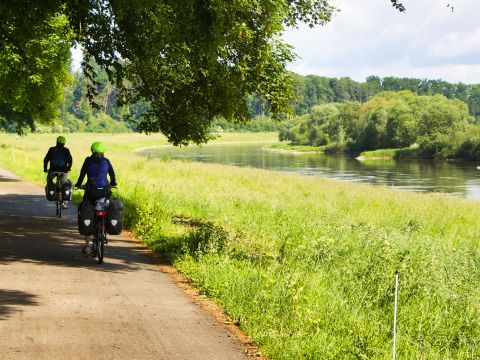
Bonus tip: I want to visit Germany without travelling!
Want to visit Germany but without travelling? We can help you with that. We’ve put together some great destinations for you to explore digitally. You might like to start with a virtual tour of some of the most impressive spots:

Frankfurt’s New Old Town is a spectacular sight, shown here in 360-degree video:

But there are lots of other ways to explore Germany on the internet without setting foot in the country. Try our tips for a virtual visit to Germany:

Official websites use .gov A .gov website belongs to an official government organization in the United States.
Secure .gov websites use HTTPS A lock ( A locked padlock ) or https:// means you’ve safely connected to the .gov website. Share sensitive information only on official, secure websites.
- Search ITA Search
- Market Overview
- Market Challenges
- Market Opportunities
- Market Entry Strategy
- Agricultural Sector
- Aerospace/Defense/Security
- Advanced Manufacturing
- Healthcare and Medical Technology
- Information and Communications Technology (ICT)
- Smart Cities
- Travel & Tourism
- Trade Barriers
- Import Tariffs
- Import Requirements and Documentation
- Labeling and Marking Requirements
- U.S. Export Controls
- Temporary Entry
- Prohibited and Restricted Imports
- Customs Regulations
- Standards for Trade
- Trade Agreements
- Licensing Requirements for Professional Services
- Distribution & Sales Channels
- Selling Factors and Techniques
- Trade Financing
- Protecting Intellectual Property
- Selling to the Public Sector
- Business Travel
- Investment Climate Statement
Travel and tourism are critical drivers of economic growth and employment in the United States, accounting for nearly 3% of U.S. gross domestic product (GDP). With one domestic job stemming from every 69 international visits to the U.S., and 9.9 million American jobs paying more than $322 billion in employee compensation, approximately 1 in every 20 jobs in the nation is contingent upon continued travel and tourism.
Germans are well-known for visiting second and third tier destinations within the United States, not just the major gateways and attractions, thus playing a critical role in the wellbeing of American tourism. All data points to the fact that Germany will remain a significant source market and partner.
Most German visitors to the United States book their travel through German tour operators and/or travel agencies, thus availing themselves of German travel package laws safeguarding their vacation investment. Whereas these packages are typically purchased early, however, the length of time between booking and travel has shortened considerably since the Pandemic. The reversal of this trend may transpire in the course of a “return to normalcy.”
The United States welcomed 1,481,000 visitors from Germany in 2022. Already in the first three months of 2023, over 318,000 travelers from Germany have arrived in the U.S, with this figure ranking among the highest for foreign travel to the U.S. Summer months are the most popular for German travel, so it is likely that this number will rise before the end of the year (ADIS/I-94 Visitor Arrivals Monitor).
For summer 2023, there are more than 400 direct daily flights (or 70 weekly flights) from Germany to the U.S. (with American Airlines, Condor, Delta Airlines, Euro wings Discover, Lufthansa, Singapore Airlines, United Airlines).
German Travel Sector: Germany’s 9,000+ travel agencies have experienced significant losses due to uncertainty, but as restrictions have been loosened, many have seen an uptick in their business.
Opportunities
The Visit USA Committee Germany e.V. plans to continue its successful series of in-person and online training opportunities for members to present to German travel industry partners and consumers. Here is a link to their extensive business plan for 2023/2024:
https://vusa.travel/business/
Contact [email protected] for details on how to sign up.
ITB Berlin, the Internationale Tourismus Boerse, one of the world’s largest travel trade shows, is scheduled for March 5-7, 2024 and will have a USA Welcome Pavilion for U.S. tourism suppliers and partners.. See https://www.itb.com/en/.
Policy Objectives and Challenges
The recovery of business travel remains ‘sticky,’ with gradual resumption of normal services; as companies have pivoted towards virtual communications, staff availability remains challenging and resulting upwards pressure on employee hours remains a concern to be addressed. High inflation, the energy crisis, and ongoing war in Ukraine are of particular worry to German consumers, and rising prices along with the connected drop in demand could present a challenge for U.S. companies. However, as of right now, demand from German travelers remains high.
Trade Events
- Oohh! The LeisureWorlds – holiday and leisure, Hamburg, February 7-11, 2024
- CMT – tourism and leisure, Stuttgart, January 13-21, 2024
- f.re.e – leisure and travel, Munich, February 14-18, 2024
- ITB – travel, Berlin, March 5-7, 2024
- IMEX – meetings and events industry, Frankfurt, May 14-16, 2024
Entry and visa regulations information
U.S. Embassy and Consulates in Germany
Official ESTA Application Website, U.S. Customs and Border Protection (dhs.gov)
Visa Navigators
Official site of the Visit USA Committee Germany
Brand USA’s consumer website in German
German landing page for Recreation.Gov (http://www.natuerlichusa.de/)
Germany - Travel & Tourism (trade.gov)
Visa Unit at the U.S. Embassy in Berlin (google.com)
U.S. Consulate in Munich (google.com)
Security Alert May 17, 2024
Worldwide caution.
- Travel Advisories |
- Contact Us |
- MyTravelGov |
Find U.S. Embassies & Consulates
Travel.state.gov, congressional liaison, special issuance agency, u.s. passports, international travel, intercountry adoption, international parental child abduction, records and authentications, popular links, travel advisories, mytravelgov, stay connected, legal resources, legal information, info for u.s. law enforcement, replace or certify documents.
Share this page:
Germany Travel Advisory
Travel advisory may 1, 2024, germany - level 2: exercise increased caution.
Reissued after periodic review with minor edits
Exercise increased caution in Germany due to terrorism .
Country Summary: Terrorist groups keep planning attacks in Germany. Terrorists may attack with little or no warning. They target tourist locations and transportation hubs. They also target markets/shopping malls and local government facilities. They target hotels, clubs, and restaurants. They also attack places of worship, parks, and major sporting and cultural events. They target schools, airports, and other public areas.
Read the country information page for additional information on travel to Germany.
If you decide to travel to Germany:
- Be aware of your surroundings when traveling to tourist locations and crowded public venues.
- Follow the instructions of local authorities.
- Monitor local media for breaking events and adjust your plans based on new information.
- Enroll in the Smart Traveler Enrollment Program ( STEP ) to receive Alerts and make it easier to locate you in an emergency.
- Follow the Department of State on Facebook and Twitter .
- Review the Country Security Report for Germany.
- Visit the CDC page for the latest Travel Health Information related to your travel.
- Prepare a contingency plan for emergency situations. Review the Traveler’s Checklist .
Travel Advisory Levels
Assistance for u.s. citizens, germany map, search for travel advisories, external link.
You are about to leave travel.state.gov for an external website that is not maintained by the U.S. Department of State.
Links to external websites are provided as a convenience and should not be construed as an endorsement by the U.S. Department of State of the views or products contained therein. If you wish to remain on travel.state.gov, click the "cancel" message.
You are about to visit:
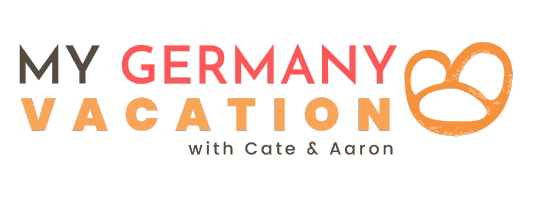
How to Plan a Trip to Germany (Your Step by Step Germany Trip Planner for Traveling to Germany for the First Time!)
This post may contain affiliate links. Read my disclaimer policy.
You’ve decided to visit Germany. Hooray! Whether you’re looking for bustling cities, sandy beaches, alpine hiking, intriguing history, fairytale castles, delicious food, fun festivals or friendly people, Germany is the perfect European vacation destination.
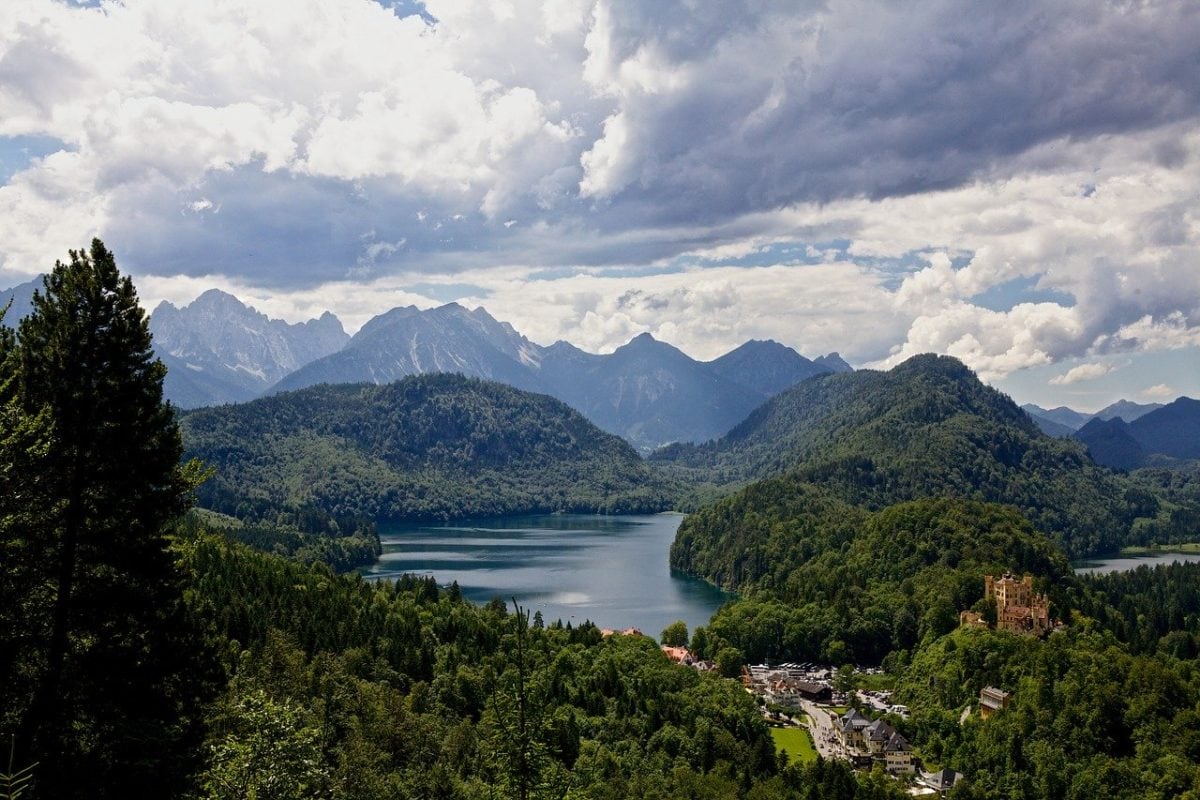
Not only is there a tremendous amount to do, see, eat, and experience in Germany, you can easily combine a visit to Germany with other European destinations. Germany is easy to get around in by train, bus, car or bike, and many people speak English.
You’re probably wondering…where do I even begin with planning my dream-come-true vacation to beautiful Deutschland?
Where should I go? Is it better to take the train or rent a car? What are the must-see cities and attractions? Which ones should I skip? Where’s the best place to stay? What should I eat and drink?
Join our FREE Germany Trip Planning Facebook Group!
Don’t worry! We’re here to help you narrow down your travel options, plan your itinerary , and book your trip with ease. It’s actually quite easy to plan a trip to Germany by yourself with the information in this article, on this site and with some help of some online booking engines.
To reduce overwhelm and help you plan your ideal vacation, we cover everything you need to know to get started planning your trip to Germany . And if you have any questions, you’re welcome to ask us in our free Germany travel Facebook community or send us an email .
Ok, let’s begin!
- 1 Meet Your Germany Travel Guides
- 2 Overview of Regions
- 3 Where to Go in Germany: Itineraries and Planning
- 4 Want more itinerary ideas? Are you a big city person? Check out…
- 5 Prefer smaller historic, picturesque cities? Check out…
- 6 What about cute little villages with “Fachwerk” (half-timber) architecture? There are so many! Here are a few ideas…
- 7 Looking forward to visiting fairytale castles?
- 8 Like islands and water? Take a look at…
- 9 What about nature, hiking, and national parks? Consider…
- 10 Passports & Visas
- 11 What’s the Best Time to Go to Germany?
- 12 Germany Booking Timeline
- 13 What’s the Weather in Germany Like?
- 14 What Time is it in Germany Right Now?
- 15 What’s the Best Way to Get to Germany?
- 16 Where to Stay in Germany
- 17 Getting Around Germany
- 18 What to Wear in Germany
- 19 My Absolute Favorite Travel Clothing Items
- 20 What to Eat in Germany
Meet Your Germany Travel Guides
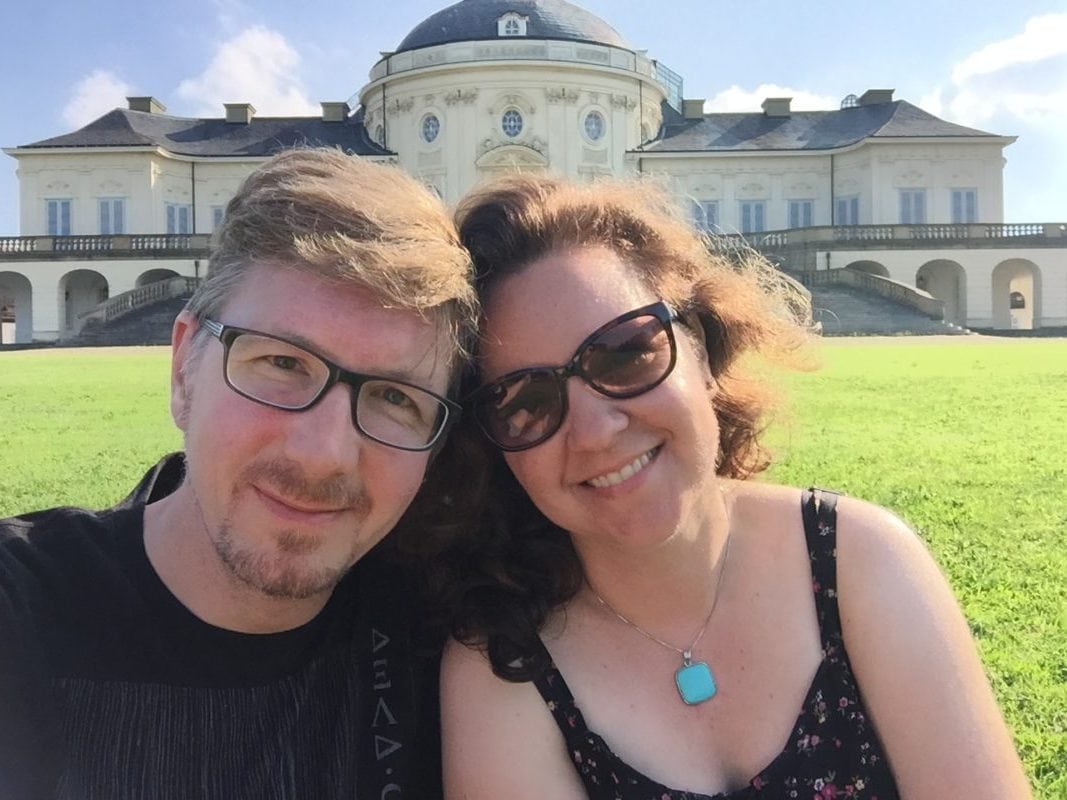
Hi, we’re Cate and Aaron, and we love helping people plan amazing trips to Germany. While Aaron has visited Germany several times (and is our chief rental car driver!), I lived there for 4+ years, have spent nearly 30 years of my life going back and forth between the US and Germany, and have traveled to all corners of the country.
I also taught German for several years and have a PhD in German Applied Linguistics, which means I’ve gotten to know Germany from several different angles. We’re so excited to help you plan your dream trip to Deutschland!
Overview of Regions
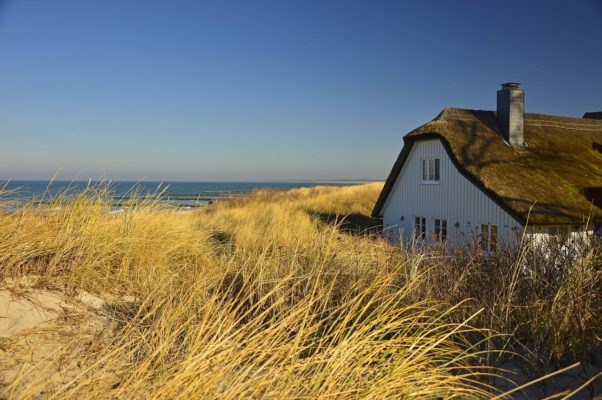
Northern Germany – Hamburg is the largest city in this region but there are other must-visit smaller cities like Lübeck , Stade, Bremen, and Lüneburg. Northern Germany also has the beautiful beaches of the North Sea and the Baltic Sea, the Wadden Sea national park, and the islands of Sylt, Flör, and Heligoland. Northern Germany is flat and great for biking. It looks so different from Bavaria! Combine a trip to Denmark with a visit to northern Germany.

Eastern Germany – Berlin is of course the feature city in this region, but Dresden, Leipzig, Magdeburg, Quedlinburg, Bautzen, Erfurt, and Weimar are smaller must-see cities. There’s also the Harz mountains, Swiss Saxony national park , Saalfeld Fairy Grottoes in Thuringia, Wernigerode castle, the Schwerin Palace, and Sansouci in Potsdam. Combine a trip to eastern Germany with a visit to Poland or the Czech Republic.

Central Germany – This region offers bustling cities like Cologne , Düsseldorf, and Frankfurt , smaller cities like Aachen, Wiesbaden, Koblenz, and plenty of cute villages. There’s also the Rhine and Mosel river areas, vineyards, the Eifel national park, castles , and beautiful rolling hills. Combine a visit to central Germany with a trip to the Netherlands, Belgium, Luxembourg, or France.
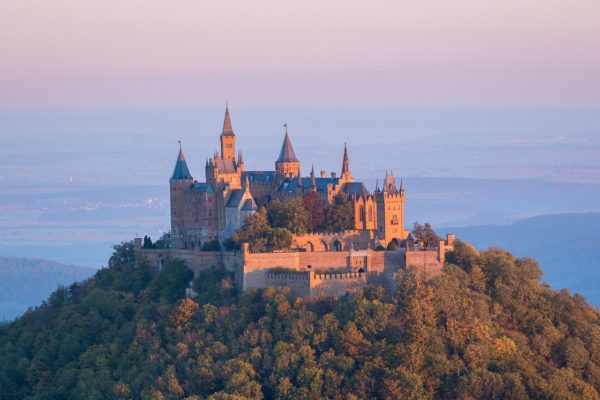
Black Forest/Baden-Württemberg – Stuttgart is the largest city in this region, and smaller cities like Baden-Baden, Heidelberg, Freiburg , Tübingen, and Ulm also warrant a visit. Vineyards and wineries, spa towns, castles (such as Hohenzollern or Lichtenstein ), waterfalls, Lake Constance, cute villages, and hiking are also features of the Black Forest /Baden-Württemberg region. Combine a trip to France or Switzerland with a visit to southwestern Germany.
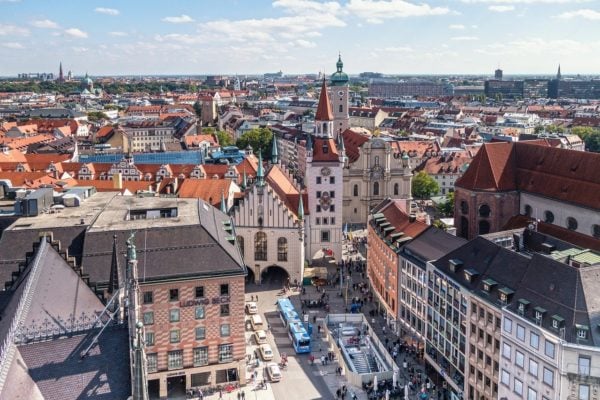
Bavaria/Alps – Munich is the feature city of Bavaria ( Oktoberfest! ), along with smaller cities like Regensburg, Nuremberg, Würtzburg, Bamberg, and Passau. There’s also the famous Zugspitze, Eagle’s Nest, Neuschwanstein castle , and Chiemsee lake, as well as lovely alpine towns like Garmisch-Partenkirchen and Berchtesgaden . Combine a trip to Bavaria with a visit to Austria, Czech Republic or Switzerland.
Click here for what to do in Munich!
Where to Go in Germany: Itineraries and Planning
There’s so much to see and do in Germany! Here’s some info to get you started on your itinerary (you can also check out this article with 10-14 day itinerary ideas ).
If you have just a few days, I recommend focusing on one city and a day trip (e.g., Hamburg with a day trip to Lübeck or Munich with a day trip to Neuschwanstein ).
If you have a week, you could visit 2 cities (plus 2 day trips) in different parts of Germany and allot one day for travel between cities (e.g., a few days in Munich with a day trip to Chiemsee, travel day to Berlin, then a few days in Berlin with a day trip to Potsdam). Or you could spend a week touring one region of Germany (e.g. the Black Forest or the Rhine and Mosel areas).
If you have two weeks, you can see a lot of Germany! You could, for example, start in Berlin, then visit Hamburg, take a day trip to Lübeck , then visit the Rhein river area, stop in the Black Forest , and end your trip in Munich. You could easily do this trip via train or car. Take a look at a couple 10-14 day itineraries we’ve outlined to give you a sense of how much you can do in that amount of time.
Grab our FREE Germany Trip Planning Checklist Now!
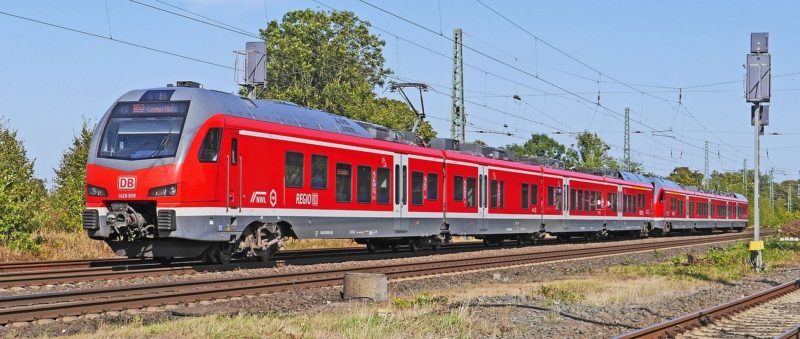
How long does it take to travel around Germany by train?
It’s quick and easy to travel around Germany by train. Here are some sample travel times to give you an idea:
- Berlin to Hamburg – 1 hour 45 minutes
- Berlin to Munich – 4 – 4 1/2 hours
- Hamburg to Lübeck – 1 hour
- Hamburg to Cologne – 4 hours
- Hamburg to Munich – 5 hours 40 minutes
- Frankfurt to Nuremberg – 2 hours
- Stuttgart to Munich – 2 1/4 hours
- Munich to Berchtesgaden – 2 hours
I use and recommend the official German rail system website to check travel times and book train tickets (point-to-point, saver tickets, and discounted regional tickets). I book all of our train tickets here!
Want more itinerary ideas? Are you a big city person? Check out…
- Cologne / Düsseldorf
Prefer smaller historic, picturesque cities? Check out…
What about cute little villages with “fachwerk” (half-timber) architecture there are so many here are a few ideas….
- Wernigerode
- Quedlinburg
- Dinkelsbühl
- Rothenburg Ob der Tauber
- Berchtesgaden
Looking forward to visiting fairytale castles?
- Neuschwanstein & Hohenschwangau (the “Disney castle”)
- Castles near Frankfurt
- Castles near Cologne
- 16 castles to visit in Germany
Like islands and water? Take a look at…
- Husum (North Sea)
- Timmendorferstrand (Baltic Sea)
- Lake Constance (Bodensee)
- Titisee
What about nature, hiking, and national parks? Consider…
- Schleswig-Holstein Wadden Sea National Park
- Hamburg Wadden Sea National Park
- Lower Saxon Wadden Sea National Park
- Jasmund National Park
- Western Pomerania Lagoon Area National Park
- Müritz National Park
- Lower Oder Valley National Park
- Harz National Park
- Kellerwald-Edersee National Park
- Hainich National Park
- Eifel National Park
- Hunsrück-Hochwald National Park
- Saxon Switzerland National Park
- Bavarian Forest National Park
- Berchtesgaden National Park
- Black Forest National Park
How about a road trip? Why not drive the…
- German Timber-frame Road (northern to southern Germany)
- Romantic Road (Bavaria and Baden-Württemberg, north/south)
- Castle Road (Bavaria to Baden-Württemberg, east/west)
- Wine Road (Palatinate wine region, north/south)
- Fairytale Route (from Hanau to Bremen, south/north)
- Black Forest High Road (Baden-Württemberg, north/south)
- Alpine Route (Baden-Württemberg to Bavaria, east/west)
- Volcanic Route (Rhein River and Eifel mountains, north/south)
Passports & Visas
If you’re from the US, Canada, Australia, New Zealand and many other countries, you do not need a visa to enter Germany (at the time of publishing this article). You do, however, need a valid passport with at least 3 months validity AFTER your planned departure date.
Play it safe and have MORE than 6 months validity on entrance to Germany! You also need at least 2 blank passport pages at the time of your arrival. Check your passport NOW so you have plenty of time to renew it if needed. Do not wait until the last minute to do this (been there, done that – it’s expensive and stressful)!
Germany is part of the Schengen zone, which means you can stay in Germany for up to 90 days without a visa. If you visit other countries in the Schengen zone before or after Germany, that counts towards your 90 days and reduces the amount of time you can spend in Germany. While on the automatic 90-day tourist visa you may not work but you can engage in business.
What’s the Best Time to Go to Germany?
The best time to visit Germany is whenever you can get there! No, seriously! There’s no best time of year for your Deutschland tour because there’s no bad time of year to visit. I’ve traveled all over Germany in spring, summer, fall, and winter and enjoyed every single season (Cate here, writing this article, by the way).
When should you travel to Germany? Well, it just depends on what you’re looking for…
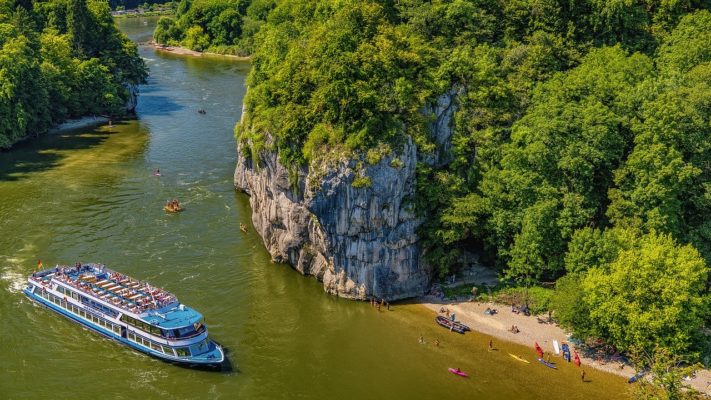
Summer is when you’re most likely to have warm (even hot) sunny weather. But it’s not guaranteed. I’ve had hot steamy summers in Germany (like last summer when we traveled during a heat wave), cold rainy summers, and everything in-between.
Fortunately, even if you encounter rain in the summer it likely won’t last more than a few hours or at most a couple days before you’ll see the sun again. The benefit of summer travel is that you’ll have nice long days for sight-seeing because the sun doesn’t fully set until about 10pm. If you’re interested in beaches or mountains, summer is a great time of year to visit.
Note, however, that not all hotels, cars, and restaurants use A/C. If you really hate hot weather, play it safe and avoid Germany in the middle of the summer. (Although, to be honest, in all of the summers I’ve spent in Germany, there have only been a few days in the summer that I’ve found truly unbearable without A/C.) If you must have A/C, be sure to confirm that your room or rental car has it.
Summer can also be a more crowded time to travel, since so many families make use of summer break. Book accommodation early for the most options and best prices!
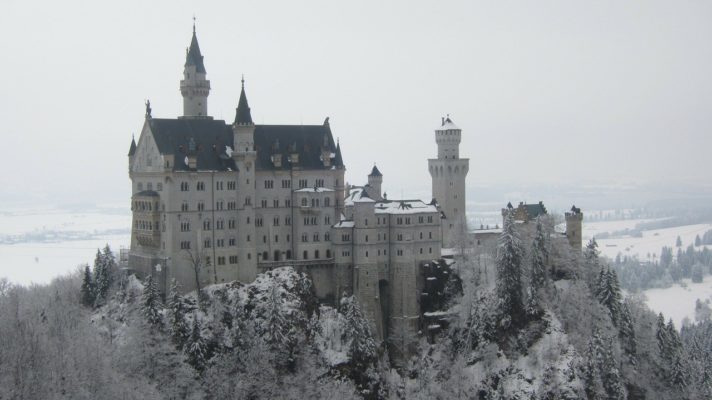
Winter travel in Germany can be cold but beautiful. One of my favorite times of year to travel in Germany is during the four weeks of advent at Christmas.
Yes, it gets dark early (by 5pm or a bit earlier) but the lights, decorations, and Christmas markets more than make up for it. Plus, you can go skiing and enjoy other winter activities.
I was just in Germany for a couple weeks in December and the weather was perfectly fine 90% of the time. There was only one day where the weather was truly miserable and even on that day there were enough breaks in the weather to enjoy my day trip exploring a new town and a new Christmas market.
Germans don’t let winter keep them from enjoying outdoor activities, hiking to strolling through a Christmas market or enjoying a coffee at an outdoor cafe. Don’t let it stop you, either! Just bundle up, grab a mug of Glühwein, and you’ll be fine!
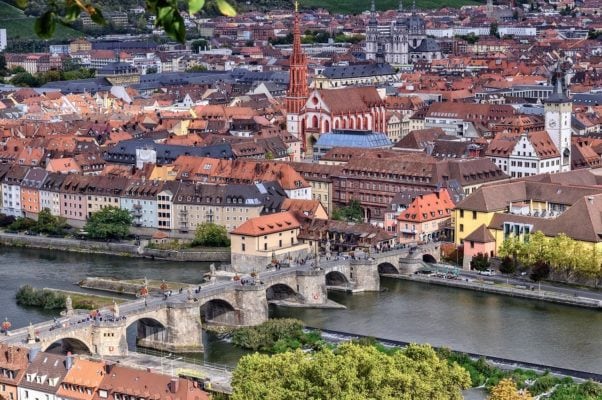
Fall and spring are also great times to visit Germany. In the fall you’ll enjoy crisp mornings and cool evenings and seeing the leaves change color.
In the spring you’ll experience the joy everyone feels when they can once again sit outside at cafes and restaurants. The weather can vary quite a bit day to day but if you travel late in the fall or early in the spring you can score great deals and will find smaller crowds.
Germany Booking Timeline
I’ve booked flights, accommodations , and tours and tickets a few weeks before my arrival, and I’ve booked them several months in advance. Book early if you:
- Are traveling during peak summer, Christmas market or ski season
- Have very specific travel dates or lodging, transportation, sight-seeing needs
- Are visiting big cities
- Are on a tight budget
- Are visiting during a special event, such as Oktoberfest
I usually start looking at my options as early as possible so I can figure out what a good deal looks like for my travel dates. I then set up flight alerts and start earmarking AirBnB’s and hotels. I begin booking whenever I find something that meets my needs and fits my budget.
Here’s a general booking timeline to get you started:
6-12 months in advance:
- Research and book your international flights
- Research travel insurance
- Plan your travel itinerary and dates
- Research and book flights within Germany or Europe
- Research travel options within Germany (rental car, train bus, etc)
- Research accommodation options (book if you find great deals or if availability is limited)
- Make sure your passport is up-to-date (you need at least 6 months left on it when you enter Germany) and apply for a new one if it isn’t
3 – 6 months in advance:
- Book accommodation
- Book trains or busses (usually 90 before your travel dates is the earliest you can book but always check if you can book earlier – the best deals go fast)
- Book rental car
- Book tours, events, and tickets
- Book travel insurance
- Review your travel wardrobe and gear and purchase the items you need
1 month in advance:
- Book any remaining attractions and tours
- Book airport transfers or plan how you will get to your lodging
- Purchase a sim card for phone or check how you can use your current phone service in Germany (e.g., I can use my Verizon phone service for a $10/ a day fee)
1 week in advance:
- Print out or ensure that you can easily access all bookings, tickets, and travel info on your phone (make sure you can access everything without data or wifi!)
1 day in advance:
What’s the Weather in Germany Like?
What will the weather be like when you visit Germany? Well, it depends on the time of year and where you are. Weather in Germany can be somewhat unpredictable no matter the time of year.
I recommend being prepared by wearing layers, packing an umbrella or rain jacket, and remembering that the weather will likely change soon. And, as I said earlier, don’t let any kind of weather stop you from enjoying Germany!
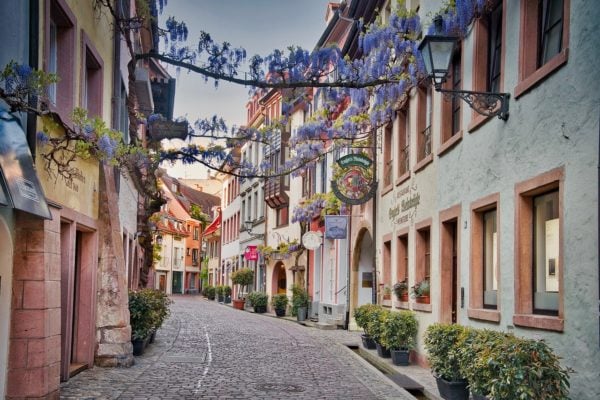
Summer. Germany comes alive in the summer with everyone and their dog (literally, there are dogs everywhere) outside enjoying the nice weather. Average high in the summer is 80F.
Be warned…it can rain in the summer but it doesn’t usually last that long. It can also be super hot in the summer…but again, scorching temperatures doesn’t usually last that long.
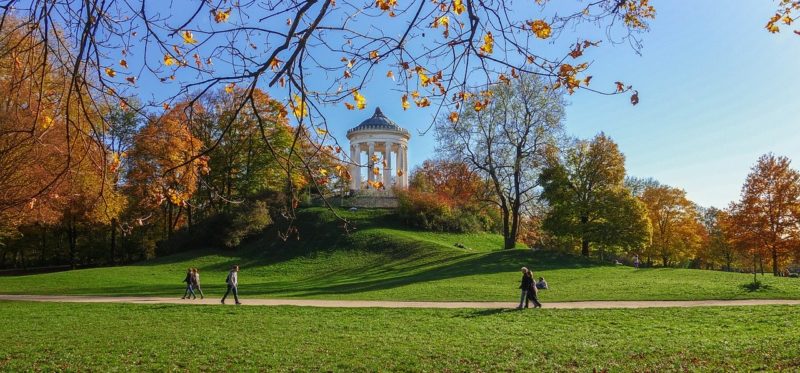
Fall. Such a beautiful time of year in Germany with the leaves changing colors and cool, crips mornings and evenings and warm days. One of my favorite times of year in Germany! In September, the average high is 67F and by November it’s around 47F.
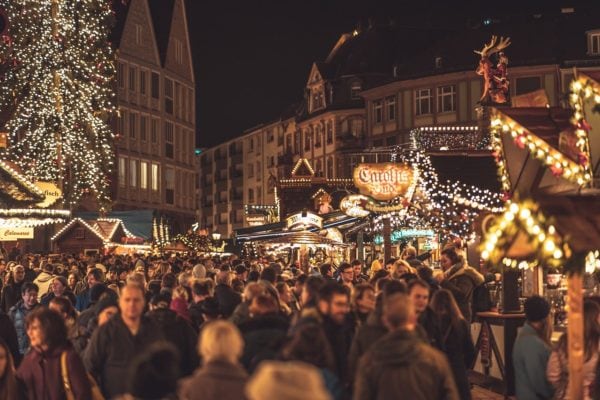
Winter. Bring your scarf, hat, and mittens because German winters can get cold! Average temps hover around freezing with warmer days in the 40s/50sF. While it can snow anywhere in Germany, you’ll find the most snow in southern Germany. Winter weather doesn’t mean everyone hides inside, though. On the contrary! Do what the Germans do – bundle up and enjoy the outdoors.

Spring. I love being in Germany on the first spring day because everyone heads outside to enjoy the sun and everyone is in such a good mood! Early spring will see a high around 47F but by late spring it’s more like 67F.
What Time is it in Germany Right Now?
Germany is in the Central European Time zone (CET) or UTC+2. It’s 6 hours ahead of the US EST, 7 hours ahead of CST, 8 hours ahead of MST, and 9 hours ahead of PST.
Daylight savings in Germany in 2020: time “falls back” on October 25 and “springs forward” on March 29. Write these dates in your calendar so you don’t accidentally miss any flights or trains (been there, done that)!
What’s the Best Way to Get to Germany?
It depends on where you’re coming from and where you’re going. When flying from outside Europe, many people fly into Frankfurt (FRA), the largest airport in Germany and one of the largest and busiest airports in Europe.
The benefit of flying into Frankfurt is that it has a ton of direct flights, and once you reach Germany you can easily take a commuter flight, train, bus or rental car to your final destination.
The downside? The airport is huge, busy, and I’ve noticed prices into Frankfurt have been higher than regional airports in Germany.
I used to always fly into Frankfurt , and then take a train, bus or rental car to my final destination. But recently? I’ve found that it’s easier (and sometimes cheaper) to bypass FRA and fly into other German cities, such as Munich , Hamburg , Berlin , Düsseldorf ( Cologne ) or Stuttgart .
You might even be able to find a direct flight from the US (I’ve flown direct Atlanta – Stuttgart and Washington DC – Munich, for example). Otherwise, you’ll change planes somewhere in Europe and take an easy 1-3 hour flight to Germany. We’ve changed planes in London, Amsterdam, Stockholm, Paris, and Vienna, for example. You could also fly into another European city and then take a train, bus or rental car into Germany.
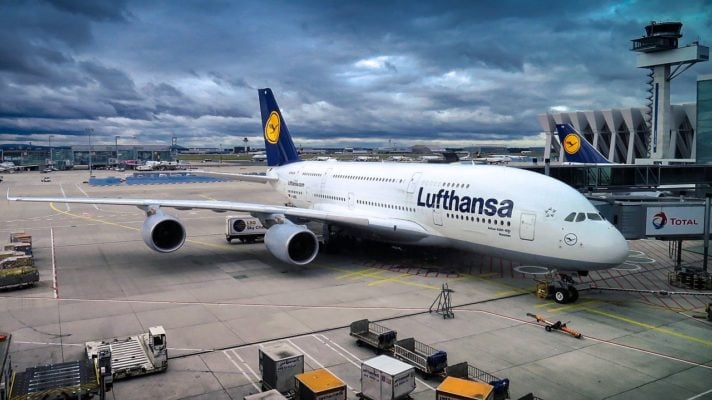
A Few Notes About Flying Into FRA (Frankfurt Airport) and Traveling Onwards
If you take a commuter flight from Frankfurt (FRA) to your final destination in Germany, you’ll go through passport control in FRA and then to your connecting gate. Super easy. Most flights from FRA to elsewhere in Germany are an hour or less in duration.
If you’re traveling onward by train from Frankfurt, you can transfer to the train right at the airport below Terminal 1. If your train leaves from the main station in Frankfurt, you can either take the S-bahn or a regional train from the airport to the Hauptbahnhof (main station) in about 10-15 minutes.
Important: you’ll find cheap “savings fare” train ticket prices if you book your ticket online well ahead of your arrival. Be sure to book your ticket for at least a few hours after your flight’s arrival time into FRA.
Be warned: getting through passport control, customs, picking up your checked luggage, and making your way to the train station can take longer than you think. And if your plane from the US (or elsewhere) is delayed…well, it’s easy to miss your train and have to buy a new, much more expensive ticket on the spot. Personally, I would book a saver fare train ticket for a train that leaves 3-5 hours after my international flight’s arrival time – at the minimum. And that’s still cutting it close if there’s any kind of delay!
Tip: If you want maximum flexibility and peace of mind, buy a “flex ticket.” You’ll pay more but these tickets aren’t tied to a specific train. So if your flight is five hours late, you can take a train later in the day without changing your ticket or losing money.
These tickets also you to stop somewhere en route to your final destination for a couple hours, and then get back on a different train (e.g., stop in Stuttgart for a couple hours on your way to Munich). So if you arrive on time, you can work in a short excursion on the way to your final destination (store your luggage at a locker in the train station). If your flight is late, just go directly to your destination. These tickets are also refundable before the first day of travel.
For ultimate flexibility and peace of mind, spend the night in or around Frankfurt and book a saver fare train for early the next morning.
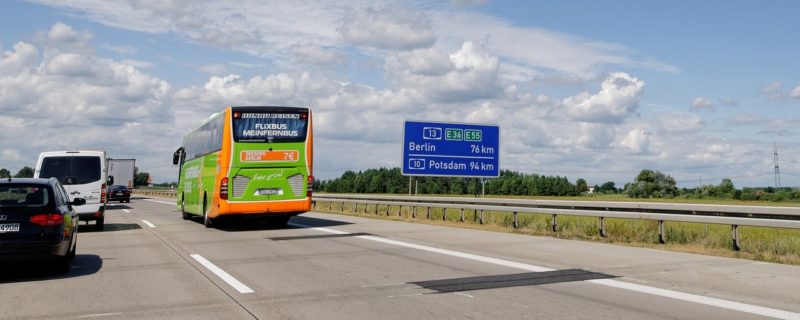
You can also easily pick up a rental car at FRA and drive to your final destination. Aaron and I have done this a few times and never had any problems.
The one problem we do have? Staying awake long enough to drive to our destination! We usually keep the driving distance to an hour or two on the day of our arrival and drink a lot of coffee. Sometimes we pull over at rest area and take a nap.
If you want to rent a car at the airport and are concerned about driving while jet lagged, consider picking up the car and then spending the night in nearby town, such as Wiesbaden (I spent an enjoyable few days there before catching my flight home a few years ago).
If you’re catching a bus from the city center to travel onwards, S-bahn 8 or 9 will zip you into town quickly and cheaply in about 10-15 minutes. Buy tickets at any of the ticket machines before you board the S-bahn.
You can also catch busses into Frankfurt and elsewhere in front of Terminal 1 (arrivals level) and Terminal 2 (level 2).
You’ll find taxis in the same general area. It takes about 20 minutes to get into downtown Frankfurt by taxi.
Flying to Germany from Elsewhere in Europe
These days it’s super easy and generally inexpensive to fly to Germany from all over Europe. Here are a couple tips:
When booking your international flight, you might be able to include a stop-over in the city where you’ll transfer to your Germany flight. I used to do stopovers in London, and a couple years ago I did an awesome stopover in Iceland. TAP also offers free stopovers in Lisbon or Porto.
I highly recommend looking into both flying and taking a train (or bus) into Germany, especially if you’re arriving from a neighboring country and not on a stopover. Of course, if you’re flying from cities like London, Barcelona, Rome or Oslo, flying is the best option. But if you’re traveling from Paris, Vienna, Copenhagen or Prague, for example, a train might be the better way to go.
Even if the actual flight is only an hour, you have to factor in the time it takes to travel to the airport, go through security, potential flight delays, and then traveling to your lodging once you land. A 5- or 6-hour train ride might actually take less time than a 1-hour flight when you total it all up!
Traveling to Germany By Train, Bus or Car
Traveling to Germany from other European countries by train, bus or car is easy. Train travel is generally simple, comfortable, and quick. Most train stations in Germany are located in the city center, so it’s easy to get to your lodging via taxi or public transportation.
If renting a car in another country, just double check that you’re authorized to take the car out of the rental country. If you are, you’ll have no problems crossing the boarder and driving around Germany.
Busses tend to cost less than trains, and you can find some amazing deals, but to be honest, I still prefer taking trains over busses. Trains are more comfortable, you can get up and walk around, and they’re almost always faster than busses. Plus, they don’t get stuck in traffic.
Tips for Booking the Best Flights with Cash or Miles:
- Start looking for flights early, especially if you’re traveling during peak season. I booked our mid-June flights in late January. While we found low mileage flights for very specific weekend travel dates, we could have found better flight times had we booked even earlier.
- Track flights through google or look at options in Hopper so you’ll know a good deal when you see one.
- Look for last-minute deals. When I decided to go to Germany in December I didn’t start looking for flights until early November (the trip was a last-minute decision). Because I was flexible on travel dates and went early in the month, I found excellent tickets using miles. This doesn’t always happen, but it never hurts to look for deals, even if your travel dates are right around the corner.
- Fly in or out of smaller regional airports (e.g., Berlin , Hamburg , Stuttgart , Munich , Düsseldorf). When I booked our flights for mid-June I couldn’t find anything into Frankfurt using miles. But I did find flights into Berlin and out of Stuttgart, and that actually worked even better for that trip ! For my recent December trip , I found that flying in and out of Stuttgart used the lowest amount of miles and had the best schedule. I’ve also flown into Hamburg and Munich airports.
Where to Stay in Germany
Germany has so many options for lodging:
- Vacation rentals (e.g., VBRO, AirBnB)
- Hip boutique hotels
- Quirky hostels
- More traditional HI hostels
- Large hotel chains
- American-styles hotels (Hilton, Marriott, etc)
- Family-run Pensionen (bed and breakfast)
- Camping (RV and tent)
When we’re in Germany we typically opt for AirBnB (I like having a kitchen to make breakfast) or a smaller family-run Pension or boutique hotel. We used to stay in hostels when we was younger (they’re pretty nice in Germany) but even then I found Pensionen to be very affordable – sometimes more affordable than hostels – especially when traveling with one or two other people. If we’re spending the night near an airport or train station and want convenience and ease we’ll stay at a larger chain hotel .
Whether you’re looking for luxury or budget accommodations, you’re sure to find what you’re looking for in Germany! To help you get started, check out our Germany hotel guides.

Breakfast is often included with lodging in Germany (but not always). Sometimes breakfast will feature fresh bread or Brötchen (delicious German rolls), cold cuts and cheese, butter and jam, and tea and coffee. Other times there will be an extensive breakfast buffet that includes things like yogurt, museli, a variety of breads, meats, cheeses, and even hard-boiled eggs. You’re unlikely to find things like omelets, bacon, pancakes, waffles, and hot oatmeal.
If you’re looking to save money on lodging, book rooms with a shared bathroom. (This is typically only an option in smaller or older hotels and not an option I come across as often anymore.) Sometimes that will mean sharing a full bathroom with other guests on your floor, and other times you’ll have a sink and/or shower in your room and will share a toilet located in the hallway. Shared bathrooms are more common in smaller Pensionen than in hotels.
These days I prefer the convenience of having a full bathroom in my room but I’m not averse to sharing a hall bathroom when needed (takes me back to my younger backpacking days – ha!). I’ve never had to wait to use a shared bathroom or had any trouble with them. Sometimes there are two or more bathrooms per floor. If you do opt for a shared bathroom, bring flip-flops!
Hostels can be a great option for families, as many offer family rooms. Hostels typically offer a simple breakfast and sometimes dinner. While accommodations are simple, some hostels can be in spectacular locations. The hostel in Bacharach, for example, is in an old castle on a hill and offers a gorgeous view of the town below and the Rhine river!
Getting Around Germany
One of the benefits of traveling in Germany is that it’s super easy to get around the entire country. You have so many transportation options.
You can rent a car and drive from place to place. Or you can stick to trains and busses. Or ride a bike – there are tons of bike paths throughout Germany.
If I’m primarily visiting big cities I prefer taking the train or a bus to get from one city to another. When I spend more time in smaller cities or want to take day trips to harder to reach places, I prefer having a car.
For our recent summer trip to Germany, we rented a car at the Berlin airport and returned it to the Stuttgart airport. We didn’t take trains or busses at all. We got a car so we could go to places that aren’t as easily (or quickly) accessible by train. We didn’t use the car every day, though. We walked and used public transportation when exploring cities.
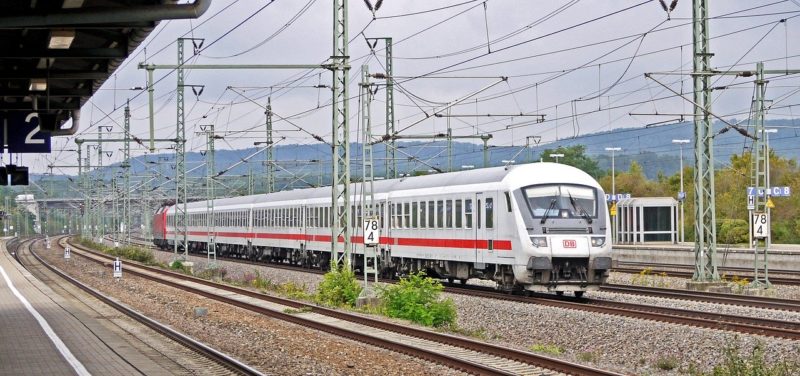
Speaking of public transportation, Germany’s is one of the best! It’s super easy to get everywhere you want to go via the S-bahn (above ground metro), U-bahn (underground metro), Strassenbahn (street car), and city bus. Taxis (and Uber/Lyft, where available) are also convenient options, though more expensive than public transport.
There are also car-share programs that you can look into. I haven’t used any of them and don’t know how convenient they are for travelers but it doesn’t hurt to check them out.
German cities are very walkable, so it’s easy to get around by foot. And, if you’d like to bike around like a local, there are lots of places to rent bikes (or scooters!) around town or maybe even at your hotel or AirBnB. If you’re more interested in just one afternoon of biking, try a city bike tour!
A few transportation tips:
- For the best train ticket prices book your ticket via the official German rail system website in well in advance. I book all of our tickets there. Note: if you pre-purchase your ticket at the lowest price you have to take the specific train you booked. If you miss that train, you have to buy another ticket.
- If you don’t mind taking slower regional trains you can get some really cheap tickets and regional day tickets. You may not want to use these tickets to go from Munich to Hamburg, but they’re great for day trips, whether traveling solo or with others.
- Busses are often less expensive than the train (though not quite as comfortable and often slower).
- There are Eurail options for Germany, and they’re a great choice if you value flexibility and ease or if you want to make stops while traveling (eg., stop in Cologne for a couple hours while traveling from Hamburg to Munich).
- If you plan to rely on public transportation in the cities you visit, buy a day pass (or perhaps a multi-day or week pass) rather than individual tickets. Also check to see if there are group day tickets or if young kids can ride free. Note: there’s often a small additional fee to bring a bike or a large amount of luggage on public transportation. There are often less expensive day passes for travel starting after 9am.
What to Wear in Germany
Check out my packing list for Germany!
Layer, layer, layer! The weather in Germany is often unpredictable so your best bet is to bring layers so you can customize your wardrobe on the fly. Since rain is a possibility any time of year, you may want to bring a light rain jacket or an umbrella.
Bring comfortable shoes. You’ll no doubt walk all day long (often on cobblestone), so bring your most comfortable, supportive shoes. Be sure to break in your shoes before you travel. There’s nothing worse than realizing a day into your trip that your shoes pinch your toes or give you huge blisters. (Bring along moleskin, just in case. I always have this kind in my day bag!) I typically bring a good pair of walking shoes appropriate for the season (e.g., boots in the winter) and a nicer pair of flats (sandals in the summer).
You can wear jeans. Some people say never travel with jeans but I’m not one of those people. I love traveling with jeans! They’re comfortable, I can wear them a few times without having to wash them, and I feel less like a tourist wearing them because everyone wears them. If you like jeans, wear jeans.
Scarf, hat, gloves. If you’re traveling in the winter or even late fall or early spring, definitely bring a warm scarf, hat, and gloves or mittens. Or buy them in Germany and take them home as a souvenir! Almost all of my winter accessories are from Germany. Even if you’re not traveling in colder weather, I recommend a travel scarf with a hidden pocket for ease and security.
You can wear shorts in the summer. Shorts are more popular in Germany than they used to be, so if you like them and are comfortable in them, wear them. That said, do also bring summer dresses or skirts and or lightweight pants to wear when shorts are too informal.
Bring a comfortable day bag or purse. When you’re out and about all day you want a comfortable bag or purse to hold your travel essentials – wallet, phone, camera, ipad/kindle/book, umbrella, journal, etc. For peace of mind, you may even want one with special security features. Click here to read my guide for buying the best travel purse.
My Absolute Favorite Travel Clothing Items
Merino wool camisole/tank – These camisoles are the BEST for travel! They’re soft, comfortable, easy to hand wash, and they never stink. This might be TMI but a few years ago, when I was traveling solo around Europe, I wore the same merino wool tank each day for 14 days in warm spring weather. It never smelled bad! Since that experiment I don’t typically go that long without washing my tanks, but I like knowing that I could! Click here to read more reviews and buy a merino wool camisole/tank.
Foldable flats – I splurged on a pair of foldable leather flats a few years ago, and after I broke them in I started really liking them. I wouldn’t recommend them for a full day of walking (especially on cobblestones) but I like to bring my foldable flats along for a change of pace or when I want the option of wearing a cute pair of shoes but don’t want them to take up much space in my suitcase.
Merino wool shoes – I bought a pair of dark grey merino wool walking/tennis shoes a couple years ago and I LOVE them! I can wear them barefoot in the summer, and not only do my feet stay relatively cool, my shoes don’t stink when I take them off at the end of the day. I can throw them in the wash if they get dirty (though mine still look great 2 years later), they pack flat and don’t take up much space in my suitcase or travel backpack, and the heel is thick and cushioned. You can also buy replacement merino wool insoles without having to buy a new pair of shoes.
What I don’t like: the pair I have doesn’t have enough arch support for me and there’s not enough padding under the ball of my foot. The first few times I wore them they were uncomfortable after walking all day and I was super disappointed! But after adding an arch support and a gel insert under the ball of my foot (I like this one ) I loved them and now wear them all the time while traveling and at home. Many people love them from the start! Click here to to read reviews and check out merino wool shoes.
What to Eat in Germany
You’ll never go hungry while traveling in Germany! While you can always find traditional items like Schnitzel, Spätzle, Rouladen, and Bratwurst, there are plenty of healthier options, including those that are vegetarian, vegan, and gluten-free.
Many restaurants now cater to special diets and accommodate allergies, as do some specialty grocery stores. Aaron has a meat allergy and frequently eats gluten-free and has never had a problem finding delicious food in Germany.
These days Germany has a wide variety of restaurants to ft all budgets featuring cuisine from all over the world (except Mexican…I’ve yet to find good tacos in Germany). So you won’t be stuck eating Schnitzel every day – unless you want to!
We usually eat breakfast at our AirBnB or hotel, enjoy a nice lunch at a restaurant we’ve stumbled upon, and then grab a Döner, salad or pizza for dinner. We also often picnic using ingredients from the bakery and grocery store or farmer’s market.
Traditional German dishes to try: Schnitzel, Spätzle, Rouladen, Bratwurst, Sauerbraten, Schweinehaxen, Maultaschen, Currywurst, Leberkäse, Flammkuchen, Sauerkruat, Kartoffelsalat (potato salad), Quark, all kinds of German breads.
Quick lunches and snacks on the go: Döner, Falafel, Bratkartoffeln (fried potatoes), Kartoffelpuffer (potato pancakes), Bratwurst, Currywurst, salads, Brötchen filled with meat and/or cheese, fresh pretzels, pastries, cakes. Click here to see the best German street food!
Desserts & sweet treats: Schwarzwälderkirchtorte (Black Forest Cake), Bienenstich (Bee Sting Cake), cheesecake, Stollen, Frankfurter Kranz, cake, Donauwellen cake, Berliner, Lebkuchen, Pflaumenkuchen (plum cake), all kinds of pastries and chocolate – just to name a few! Click here to see the 10 must-try German desserts and sweets.
Beer: every kind you could ever imagine! I usually just ask for the local beer unless there’s a specific one I know I want to try.
Christmas: This is the best time of year to be in Germany, partly because of the many delicious holiday treats like Lebkuchen, Stollen, Glühwein, and so much more. Click here to read more about what to eat in Germany during the Christmas season.
Want to try German food now? Click here to see where to buy delicious German food online!
Got a question about traveling in Germany? Join our free Germany trip planning community or send us an email!
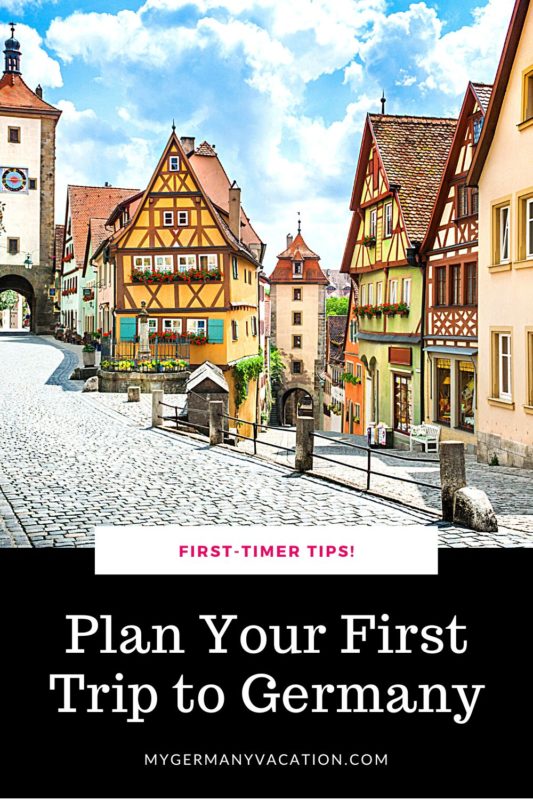
Cate has been traveling to Germany for 30+ years. She has lived in Germany, taught college German, and has a PhD in German Applied Linguistics. She loves helping travelers plan their dream trips to Germany!
Similar Posts
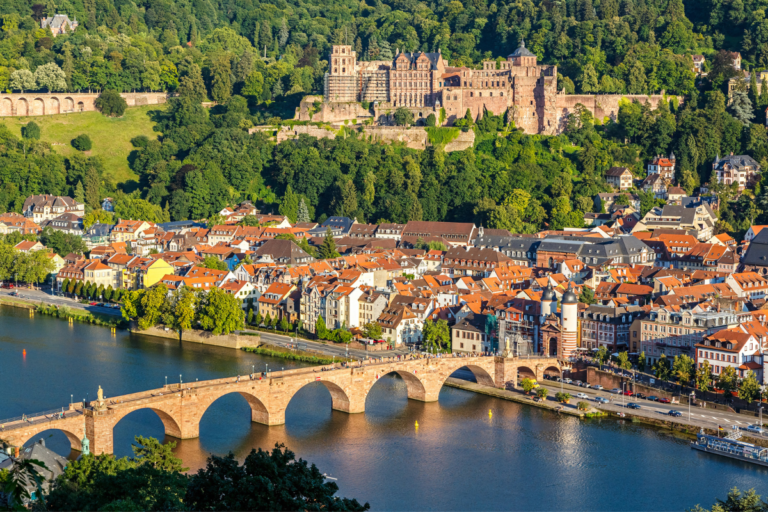
Best Things to Do and See in Heidelberg, Germany
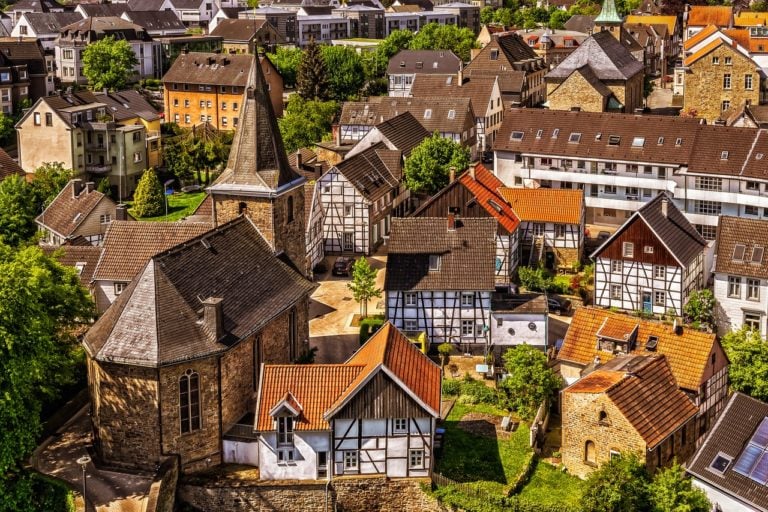
100 Things to Do in Germany
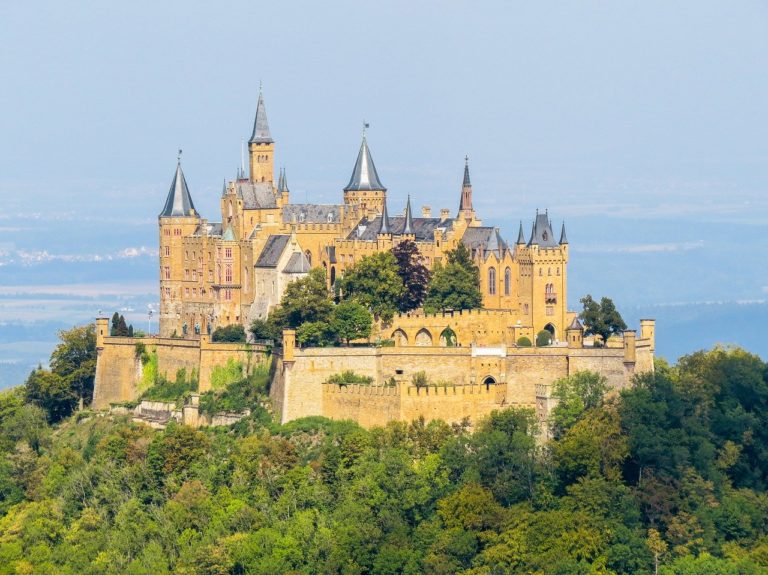
Best Day Trips & Weekend Trips from Stuttgart, Germany in 2024
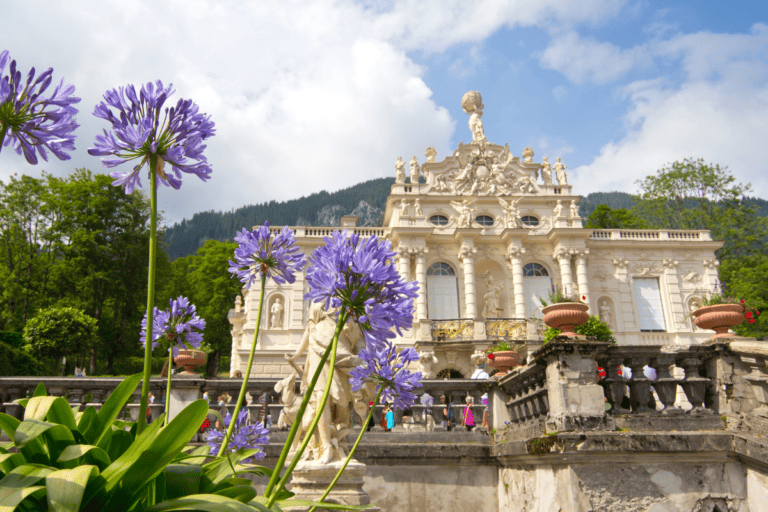
How to Visit King Ludwig’s Fairytale Castles in Bavaria, Germany
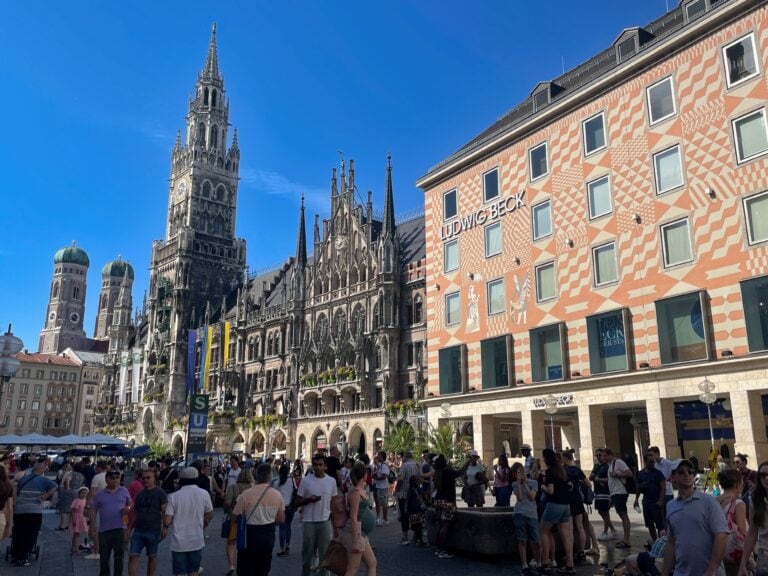
What to Do in Munich in 1 Day: the Perfect Itinerary for 2024
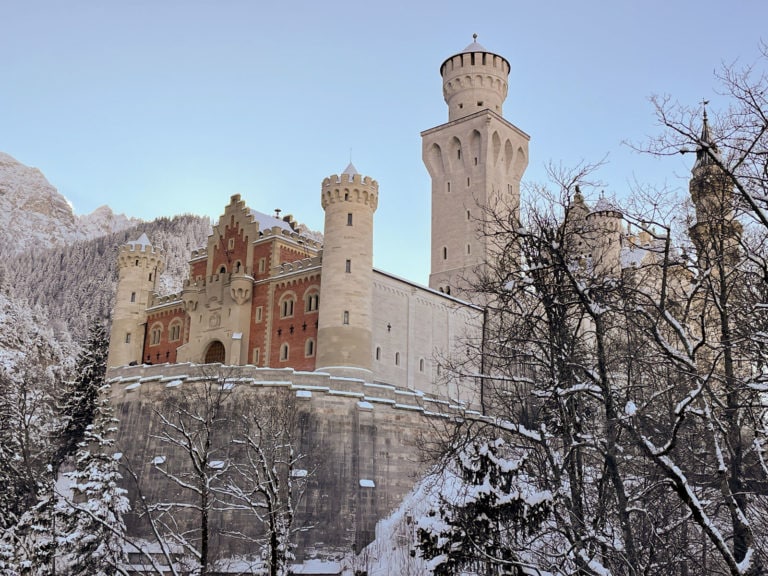
Best Day Trips from Munich in 2024
Here’s how we can help you plan your perfect trip in 2024.
GERMANY TRAVEL PLANNER: Just getting started? Have questions about Germany’s confusing train tickets or how to find the best guided tours? Not sure which parts of Germany should be in your itinerary (and what to leave out)? Our Germany Travel Planner answers those questions and more via how-to videos, our interactive Germany Planning Map, City Cheatsheets, and MUCH more. Click here to unlock the best of Germany the easy way!
GERMANY TRAVEL CONSULT: Feeling overwhelmed? Itinerary just not coming together? Wonder if a few tweaks would take your trip to the next level? Book a Mini or Full consult with Cate! She’ll help you create or tweak your itinerary, recommend train tickets/passes, hotels, things to do, guided tours, show you how to buy train tickets, orient you to specific cities, help you plan out day trips, and answer your Germany travel questions.
ACCOMMODATIONS: We recommend using Booking.com since they have widest range of accommodations available from hostels, boutique hotels, luxury chains, aparthotels, at the best prices. Check out our accommodation guides for specific recommended hotels.
WHAT TO PACK: If you’re bringing your phone, be sure to bring this plug adapter , this power bank , and this wrist strap . They’ve been lifesavers for us! You can see our other packing essentials here and here .
TICKETS & TOURS: For guided tours, day trips, private tours, and skip-the-line tickets, Get Your Guide is our go-to!
TRAINS & BUSES: To research train schedules and buy tickets or a Germany Rail Pass, we recommend the official Deutsche Bahn (German Rail System) website (and download their DB Navigator app). For buses, look at FlixBus , which offers tickets for routes within Germany and to other European countries. FlixBus is often cheaper than trains but can take longer.
69 Comments
I enjoyed reading this information. My husband and I would like to stay in Germany for 2 to 3 months in 2022. I am interested in staying in the area of Bamberg with the plan of visiting other regions in Germany via a rental car. Either at the end or beginning of our stay we would like to visit France (especially Paris). I have so many questions. But our hope is to have basically our last trip on our own and experience more of the everyday lifestyle. Up to this point we have only traveled via being guest of Viking River Cruise and tours.
Hi Donna! 2-3 months in Germany sounds awesome! Since you’ll be there so long, you might want to consider spending 1 month in 3 different regions or 1.5 months in 2 regions. Otherwise you’ll be doing a lot of overnight or multi-night trips if you want to see other regions. Are you thinking about renting an AirBnB? If you want to experience the everyday lifestyle, I highly recommend it. Feel free to email me if you have questions as you start planning. 🙂
Hi! Thank you for this awesome post. It’s very useful. I wanted to ask you a question. I’m planning to travel to Germany as soon as the pandemic starts to be less dangerous. I want to go to Germany for 2 months, how many cities do you think is possible to visit? And also how much money do you think is possible to use everyday for food if my budget is small? Thank you very much!
Hello! Two months is a good amount of time to visit Germany, and you should be able to see and do quite a lot! Just how many cities depends on how quickly you like to travel and what you want to do in each place (e.g., just see the highlights or live like a local). If you want to stick to big cities you could spend 1-3 weeks in each and take lots of day trips to see the surrounding area.
If that’s the case, you could rent an Airbnb (or similar), which would not only save you money on lodging (they’ll often give discounts for stays of 1 week or longer) but also make it easier to make some inexpensive meals at the Airbnb (and it’s easy to make German dishes “at home”!) and maybe even do laundry for free.
If you want to be on the go the whole time, moving from city to city (big, medium, and small), it will be more expensive unless you stay at hostels (or super cheap hotels). And remember to factor in the constant packing and unpacking, time getting to/from the train station (or airport)…that gets tiring when traveling for a couple months!
I recommend coming up with a budget, then looking at what kind of lodging fits that budget (hotels, hostels, longer Airbnb stays, Couchsurfing, etc). Then think about what you most want to do in Germany (live like a local, just spontaneously explore, see specific sights, have specific experiences, etc) and what you want your daily experience to be like (e.g., do you want to feel relaxed each day and get to know fewer places or be on the go, packing and unpacking, moving from place to place). Neither is better than the other, it’s just important to get clear on what kind of experience you want!
A few ways to reduce your budget: – Eat in fewer sit-down restaurants. Eat breakfast at “home”, buy snacks and drinks at the grocery store and bring them with you each day, cook some meals each week at “home”, pick up lunch from a grocery store or bakery and eat in a park, etc. Make eating dinner in a sit-down restaurant a special occasion. Doing these things will save you money and you’ll eat healthier!
– Take busses or slower trains to travel around Germany. There are regional train passes you can purchase that allow travel in a specific area very inexpensively. Travel will be slower and there are some restrictions on when you travel (often not during rush hour) but you’ll save money and often you’ll see some out of the way sights. You can also get good deals on flights but once you factor in travel to the airport (time and cost), time to check in, waiting to board, potential delays, and then getting from the airport to your final destination, it’s often just easier to take the train.
– Buy standard train tickets in advance. You can get nice discounts on faster train tickets if you book far enough in advance.
This might be more info than you wanted but I hope that helps you start planning your trip! Let me know if you have any other questions. 🙂
- Pingback: Europe Through the Seasons: The Best Time to Visit - Intentional Travelers
Great post full of detailed information on all aspects of travel in Germany. When travel reopens in Europe we’re planning on a 2 week trip in Germany with our adult son. He’s an avid soccer fan so we’ll need to plan the trip around the soccer schedule so he can see as many games as possible. We are considering Eastern Germany with a short trip into Poland or Northern Germany with a few days in Denmark. We’d really appreciate your expertise and suggestions. Although we’ve traveled extensively in many western and eastern European countries, we have not spent a great deal of time in Germany. Thanks. J.
Hello! I’m back working on this site now and am happy to help. I’ve got more articles and resources coming but let me know if you have any specific questions!
Hi Both The Ueckermann family 9-10 adults and 2 little once to experience Germany in Oct 2023. Central G and Netherlands will be awesome. We need to do all planning and funds estimates please assist. We live in South Africa and hopefully COVID 19 not a factor any more. Plan 2-3 weeks depending on the funds regards Engela
Hi Engela! Let me know if you have any specific questions about planning your trip to Germany. Happy to help!
HI, I was having trouble with your email 🙂 so sorry I am just replying here. I was hoping you could help us and I wasn’t sure if you offer buying tickets and guidance of our specific places we would like to visit. Anxiously wanting to hear back from you, Anne
Hi Anne! I just sent you an email. 🙂
Hello Cate! Such a well written article with great info! My husband and myself would like to travel to Germany in Oct. of 2022, possibly with my then 16 year old son as well. We want to go in October so we can also experience Octoberfest. I cant have beer because I have celiac’s. IS THERE OTHER ALCOHOL DURING OCTOBERFEST OTHER THAN BEER? WHAT IS THE WEATHER IN OCTOBER AND DOES OCTOBERFEST RUN THE FULL MONTH? IS THERE A CERTAIN AREA WE SHOULD STAY TO REALLY EXPERIENCE OCTOBERFEST AND ANY POTENTIAL ISSUES TO AVOID DURING OCTOBERFEST? We are overwhelmed with planning our trip because we don’t even travel within the US and I feel like there’s so much we want to experience in such a short period. We would like to go for 2 weeks. We want to go because both our families are from Germany. My family comes from Nuremburg (sp) and my husbands family Bavaria but we are unsure which part. This trip is important for us to try to learn about our family roots. DO YOU KNOW WHERE WE COULD GO IN GERMANY TO LEARN ABOUT OUR GENEOLOGY? We would like a more of a laid back approach to experiencing Germany. I dont want to necessarily feel rushed every single day but I do understand that some events and places we would want to visit would need to be scheduled and we are ok with that. I would like to do the Air bnb but know nothing about them. I would like less stress worrying about transportation such as missing busses. We are interested in castles, picturesque views, experiencing floating on the Rhine River perhaps. ANY SUGGESTIONS ON AIR BNB’S THAT PROVIDE BREAKFAST AND ANY IDEAS ON AREA’S TO VISIT BASED ON EVERYTHING I’VE PROVIDED? P.S……our last name literally translates to “the German”. We have had so many Europeans tell us that when they hear our name…LOL
CORRECTION: This is Lisa Nemec. My hubands family is Bohemian. We believe his family crossed over from Czech.
Hi Lisa! There are plenty of other drinks at Oktoberfest, both alcoholic and non-alcoholic, so you shouldn’t have any trouble finding something. The weather at that time of year can vary but in late September to early October it’ll likely be warm during the day and cooler in the evening. Oktoberfest is mostly held in late September but I believe it goes until Oct 2 in 2022. There are a lot of hotels and AirBnB’s within walking distance of Oktoberfest (also walking distance to downtown) but book early because they fill up quickly! You’ll also pay a premium at that time of year. Some people prefer not to stay near the main train station but other people don’t mind it.
As to where you could go in Germany to find out about your genealogy, I’d start by searching the genealogy sites online and get as much specific info as you can. You can then try a site like http://www.genealogienetz.de/index_en.html (I haven’t used it, just found it).
If you have 2 weeks, you could fly in and out of Munich and focus on Bavaria. While in Munich you could take a couple day trips to Salzburg, Berchtesgaden, Neuschwanstein, the Alps, etc. You could see a lot at a laid-back pace in 2 weeks!
AirBnB’s are great if you’re going to be somewhere for at least a few days, want a little extra space, a kitchen, etc. Even just being able to make breakfast, coffee/tea, and keep drinks cold for when you come home in the evening is so nice. But you don’t typically get hotel-like services like a prepared breakfast, new towels each day or linen changes. If you want to be walking distance to lots of things in Munich, a hotel near downtown could be a great option. If you’re ok with being in a neighborhood, an AirBnB could be a good choice. There are so many great neighborhoods in Munich so you really just need to look at price, amenities, and distance to the things you want to see. I’ve stayed at hotels near Marienplatz and in an AirBnB further away (maybe a 10-15 minute walk + U-bahn ride to Marienplazt) and I enjoyed both.
I hope that helps!
- Pingback: 12 Most Popular German Drinks & Beverages You Must Try In Germany | travel-boo | Portugal & Spain Travel Blog
HELP……I have been put in charge of coming up with an itinerary for my hubby and 4 of our friends for travel in July 2022. I truly have no idea what I am doing. What we are looking for are castles, beautiful scenery and history (although I have been told that they do not want to go to concentration camps). The following is the tentative itinerary I have come up with. We are looking also, for moderate priced Inns/quaint hotels and castle stays centrally located. Any changes/suggestions/comments would be GREATLY appreciated. We will be renting 2 cars. 1 night Munich drive to Nuremburg 3 nights Nuremburg – drive to Fussen 1 night Fussen – drive to Ettal 3 nights Ettal – drive to Unterwossen 1 night Unterwossen – drive to Salzburg Austria 3 nights Salzburg Austria drive to Munich 1 night Munich – fly home
Hi Linda! Your itinerary looks good for a 2-week trip. Here are few suggestions:
-If you’re flying into Munich, you could drive right to Nuremburg on the first day, since it’s only a couple hours drive from Munich airport. If you pick up your car, drive into Munich, settle into a hotel, and then drive to Nuremburg the next day, you’re using a lot of time for driving/checking in/unpacking/packing and you won’t get to see much of Munich. If you go right to Nuremburg on arrival day and stay for 3 nights, you could add a night to the end of your trip so you have 2 nights in Munich or add a day to Salzburg and keep Munich at 1 night.
-Fussen and Ettal are pretty close to each other so you could stay 3-4 nights in one and then take a day trip to the other. I like to reduce the number of one night stays as much as I can during 1 and 2 week trips for the reasons I mentioned above. You could also stay in Ettal and make day trips to both Fussen and Unterwossen and cut out 2 1-night stays.
-If you don’t want to see Munich, I’d keep that at 1 night and stay near the airport at the end of your trip. If you do want to see Munich, I’d give that 2 nights minimum.
I hope that helps! I think you’ll really enjoy your itinerary!
- Pingback: Can I Go to Germany Right Now? (Your COVID-19 Questions Answered) - My Germany Vacation
Thankyou for all the wonderful suggestions! I’m visiting Germany closer to Christmas for two weeks.
That’s my favorite time to be in Germany! Everything is so beautiful and festive. You might be interested in my Stuttgart Christmas Market article – even if you won’t be near Stuttgart, it will give you an idea of what you can do, see, and eat at any Christmas market. I also talk about 6 other nearby Christmas markets that are super fun to visit. 🙂 Enjoy your trip!!
I had all but given up on our delayed 25 yr Wedding Anniversary(07/28/2020 delayed to Sept 2021, due to covid) trip to Germany. Then I found your website! It reinvigorated our desire to NOT CANCEL our plans! We have a son in Kaiserslautern(rhein main air force base) , and want to split a 2 week trip between seeing 7-8 days traveling in Germany( Berlin, Munich, Cologne, and Stuttgart) and Paris. And then 6 to 7 day visiting our son. We had all but given up, until I read your article. Thanks! I wish that there were some way to have everything planned for us in advance! But, your post at least has assured us that we can make this happen on our own. Thank you very much!!
Definitely don’t cancel your plans, even if you have to postpone! (We had to postpone our anniversary trip, too – such a bummer!) You can definitely make your trip to Germany happen. Here are a few ideas for you…
You could fly into Paris, then travel to Kaiserslautern to see your son and do a day trip to Stuttgart (visit the Christmas market if you’re there in December or nearby Esslingen any time of year) and then either visit Munich and the area around there (fly out of Munich) or travel up to Cologne and over to Berlin (fly out of Berlin).
It’ll be a lot to try to see Paris, spend several days in Kaiserslautern, and also see Cologne, Stuttgart, Munich, and Berlin but if you can combine things – like if your son can go with you to visit Stuttgart and Munich or Cologne and Berlin, you could see a lot of the places you’re interested in. Flying into one city and out of another will help a lot, too.
You could also fly into Munich, then go to Kaiserslautern via Stuttgart, take a short trip to Paris, then go to Berlin via Cologne and fly out of Berlin. Or do the same but start in Berlin and fly out of Munich.
You’ll have a great time no matter your itinerary! 🙂
Your website is a such a great resource! I have a ton of questions about planning a trip, I’m just going to send you an email.
Thank you Komal
Got it and replied 🙂
What is a good budget for 2 adults in Germany for two weeks?
It’s nearly impossible to give a guideline because it depends on so many things – your travel style, what kind of transportation you want to use, your accommodation & restaurant preferences, etc. I know that’s not very helpful in the short-term but it would be less helpful for me to give you a specific budget not knowing any specifics about you or your trip plans. Plus, most travelers like to splurge in one area and cut back in another but that’s so different for each traveler.
What I recommend is this: start looking at flights, transportation, and accommodations well before you want to book them in order to get an idea of what each costs for your travel dates. Add everything up for 2 weeks and then decide if you’re ok with that amount so far, keeping in mind you’ll still need to add on food, souvenirs, tickets/tours, insurance, and anything you need to get before you leave (clothes, luggage, passport, etc). I like to do this research before I book flights/transport/accommodations. That way I get an idea of what will be my splurge and where I will need to reduce costs to keep within the budget that’s right for me. Everyone’s ideal budget is so different!
hi i am planning to travail to Germany in December 2021 with my family , any idea
My big tip for Germany in December: visit the Christmas markets (if they’re open this year)! You’ll find one in nearly every German city, town and even small villages. They’re outdoors so dress warmly and enjoy the food, drink, and stalls. They’re a great place to pick up souvenirs and gifts, too.
Days are short in December, and some touristy sites do shut down in winter, so keep that in mind. But you’ll still find plenty to do after dark, especially if you’re in bigger cities. As long as you take these two things into consideration, you’ll have a great visit no matter where you go!
Hi, my partner and I are wanting to visit Germany in January 2022. I have previously stayed in Wurzburg for 3 weeks and dream of taking my partner there.Seeing as I went with school a few years ago we didn’t really have a chance to look around other parts of local Germany. Where would you recommend us to go whilst in that area? We like architecture (but not too much…) we’re in our 20’s so we also want to have fun 🙂 we’ll either be driving (we live in France) or we’ll be going by train. Will the Christmas markets still be on? I doubt it but you never know… Thanks
Also, we are wanting to go with our dog. Would that be possible or too complicated?
You could easily go to Munich and spend a few days there – lots to see and lots of places to have fun. (I had a great time there in my 20s!) There are also a lot of day trip options – Berchtesgaden, Salzburg, Neuschwanstein, Passau, Regensburg, etc. You could also stop in Nuremberg on your way to Munich. All of that is easy by car or by train – and if you go by train, you could probably do those day trips using a regional train pass. Or you could do guided day trips and not have to plan anything! I’ve got some listed in my Munich guide – https://www.mygermanyvacation.com/munich-travel-guide/
It looks like the Christmas markets are on for 2021 but they could always get canceled in the coming weeks. Most have their last day on Dec. 24 so unfortunately, you won’t get to see them if you visit in January. That just means planning another trip to Germany for December 2022! 🙂
Germany is pretty dog-friendly so it’s probably do-able. But there are likely museums and other sites that might not allow dogs inside. If you mostly want to spend time outdoors, and your dog is ok with possibly very cold/wet/windy weather, or if you can leave the dog at your lodging for part of the day, it might work ok.
Hope that helps!
Hi Cate, you have put together a terrific planning guide. Thanks. Our 4 children just gave us a trip back to Germany in celebration of our 50th wedding anniversary. We lived in Erlangen from Aug 1972 – 1973. We are excited to go back but we are debating between a Rhine river cruise or going on our own. We’ll probably go sometime in May/June or Sept/Oct 2022.
How exciting!! It’s so fun to go back and revisit where you used to live in Germany. Aaron and I did that in 2019 and had such a good time seeing what had/had not changed. I’m excited for you!
I’ve heard people say great things about Rhine river cruises. If you don’t have time to or don’t want to do much trip planning, that’s a great option. The downside is that you’re more limited to what you can do and see. If you have time and interest in planning your own trip, you can definitely do it. And since travel is coming back, I’ll be focusing on this site a lot more in the coming months and helping people plan their trips, so I’ll be here to help you, too. 🙂
Hi Cate, We have wanted to visit Germany (from the US) for a few years now and have finally decided to make it happen, but had no idea where or how to start. Your article is full of valuable information. Thank you. At least we now have a starting point. Our trip isn’t for another year, but it will go quickly. So excited and thank you for all the information.
You’re welcome! I’m so excited for you already. 🙂 The next year will fly by and you’ll be on a plane bound for Germany before you know it. Now that travel is coming back, I’ll be focusing on this site a lot more so be sure to come back when you’re ready to plan your trip. I’m working on lots of guides and helpful resources! 🙂
Hello. My grandfather expressed interest in going to Germany in 2022. More specifically, he wants to go to ‘The Battle of the Bulge’ where his older brother passed away in World War II. We would also like to go to the Holocaust Memorial. I have been trying to research/plan this trip but would be open to suggestions. We are from the US and could spend about a week out there. I am grateful that I stumbled across your blog as it is very informative and interesting! 🙂
Hello! That sounds like it will be a wonderful trip for your grandfather! If you’re talking about visiting the Holocaust Memorial in Berlin (highly recommended), you could fly right into Berlin (their new airport!) and spend half of your time seeing the city, then head to Brussels and take a Battle of the Bulge day tour! I found one here that you can look at (aff link): https://www.getyourguide.com/bastogne-war-museum-l35043/bastogne-battle-of-the-bulge-tour-from-brussels-t169657/?partner_id_Y5UOFLS It looks like it also goes into Luxembourg so you could get 3 countries in one trip. 🙂 If you have enough time, you could take a day trip to Brugges or Ghent – both are 30-60 minutes from Brussels. You could then fly out of Brussels back to the US. To get from Berlin to Brussels you’d probably want to fly but it’s a short flight and you could probably get an early morning or a late afternoon flight so it wouldn’t take up your whole day. Hope that helps with your planning!
Hi, your site is wonderful and has some great information! I am traveling (solo) to Germany in late April and will be there for one month. I have been to Munich/Bavaria/Salzburg before so I’d planned on focusing my trip on the rest of Germany. I’m flying into Berlin and was planning on staying there 4-5 nights, then I’m not sure where to go. I was thinking of spending a week in an area and going on day trips; for example, the Black Forest, the middle Rhine area, maybe Harz Mountain. But I also want to see some cities like Cologne, Frankfurt, Heidelberg, Trier, and Hamburg. So maybe a bit of both cities and countryside? Do you have any thoughts? Thanks!
I definitely recommend choosing 3-4 locations where you can stay for a week or so and then take day trips. You could do longer stays in Berlin and Hamburg – there’s tons to do and see in each city, as well as lots of day trip options. You could also do Cologne or try a smaller town on the Rhein or Mosel and explore that area in more depth. For the Black Forest you could stay in the university town of Freiburg and day trip to towns/hiking in the Black Forest, as well as Basel and Colmar/Strassbourg). You could also choose 3 locations for longer stays (e.g., Berlin, Hamburg and Freiburg) and then do a couple of 2 or 3-night stays as you travel between cities, e.g., a short stay in Wernigerode or Quedlinburg (Harz mountains), Trier, Heidelberg, Stuttgart, or Tübingen on your way to Freiburg. Tip: if you want to do a lot of day trips, make sure you stay where it’s fairly quick and easy to get to the train/bus station! Since you’ll be there for a month you have lots of flexibility and plenty of time to do and see a lot of the areas you mentioned!
@Cate, Thank you so much! I’m really enjoying going through your site, too!
Looking for a good travel guide book for Germany any recommendations?
Rick Steve’s is always a good one! I’ve used his guidebooks a ton. You can get his Germany guidebook on Kindle or as a hard copy (aff link): https://amzn.to/33z7d59
@Cate, Thanks
So excited to find your site! My husband and I will travel from Texas to Bavaria for 7-10 days in September. I am in charge of all the planning. I’m thinking Munich & surrounding area and Salzburg. Do you have any suggestions? I’m also pondering some organized day tours..
Munich is a wonderful home base for seeing lots of great sites in Bavaria! You could easily spend 1-3 days in Munich (especially if you’re there during Oktoberfest) and then take day trips to places like Neuschwanstein, Garmisch-Partenkirchen, Salzburg, Linderhof, Chiemsee, Berchtesgaden, Nuremberg…just to name a few! You can easily do all of that by train and mix it up with some organized day tours here and there. I’ve been working on a Munich guide that will have ideas for day trips and tours so keep an eye out for that!
Hello Cate, Your blog is very helpful. Like to seek your help and guidance. I am from Singapore and not familiar with Germany. Both me and my wife intend to fly to Amsterdam where my daughter is attending university and spend 18 days vacation with her in Europe during her break. Am planning 7 days touring Germany. Tentatively looking tourist site at hamburg, Berlin, Stuttgart and then off to another country eg. france, switzerland or Italy for another 7 days. then travel back to Amsterdam to fly home. Any advise how we can optimize the traveling as we are not familiar with these region? Appreciate your kind assistance. regards, Perry
It will be so much fun to travel with your daughter! It might be difficult to fit Hamburg, Berlin and Stuttgart into 7 days. On the train it takes about 6 hours from Amsterdam to Hamburg, 3 hours from Hamburg to Berlin, and over 8 hours from Berlin to Stuttgart. While all three of those cities are amazing, I recommend choosing either northern or southwestern Germany, rather than trying to hit all three (or make the Germany part of your trip 10 days).
You could, for example, travel from Amsterdam to Hamburg, then to Berlin, and fly from Berlin to France or Italy. That would give you plenty of time for travel, city exploring and day trips.
Or take the train from Amsterdam to Stuttgart and explore that area. Stuttgart is close to France, so you could spend several days seeing both southwestern Germany (Stuttgart, villages in the Black Forest, Freiburg, Baden-Baden, etc) and French cities like Strassbourg, Colmar and Mullouse. You could also very easily go to Basel in Switzerland! It’s a long train ride from Amsterdam to Stuttgart so I’d look into flights. Stuttgart is a great airport to fly into!
Hi, my family and I would like to visit Germany this summer. My husband and I have two teenagers (15 and 13), and one of them is reads a lot and it is very interested in history. We would like to visit german cities but also, some concentration camps. Our plans is to spend two weeks there. Any suggestions?
You’re going to have so much fun in Germany! Everywhere you go there’s so much history, so it just depends on what kind of history you’re looking for. For a 2-week stay you could easily visit 2 (maybe 3) different parts of Germany without feeling like you’re spending your whole vacation on the train or in the car. You could, for example, fly into Munich, visit the city and Dachau concentration camp, take a few day trips to Salzburg, the Alps, Neuschwanstein, Nuremburg, etc – there are so many options!…then visit the Black Forest area, the Rhein/Mosel area, the Hamburg area or the Berlin area and fly out of that second city (Stuttgart, Cologne/Düsseldorf, Hamburg or Berlin). If you want to focus on 2 main areas, say Munich and Berlin, you could do a 1-2 night stopover in a city in-between. Hope that helps you get started on your planning! 🙂
@Cate, We are from USA planning on attending next years NfL game if possible. We are a large group 10-15people who would also like to see the culture and history. Open to staying in Berlin, munich, or anywhere else as long as accessible to get to game. We want to fly out wed night from BOS be there Th F S Su (game in Frankfurt) leave M. Anything you would recommend?
Hi! I just now saw your question. If you’re flying into FRA and have Th, F, and S to do some sight-seeing, I’d stick to the Frankfurt area and do day trips. If you go to Berlin or Munich you’ll spend most of your time in transit and checking in/out of hotels. We’ve got a Frankfurt guide on our website and also a castles guide – so you could spend a day exploring FRA, then a day visiting a castle, and then 1 day visiting a nearby city like Heidelberg, Nürnberg or Rothernburg ob der Tauber. Hope that helps! Let me know if you have any other questions. We’ve also got a Germany Trip Planner and one-on-one travel consults, too. And lots of info on this website. We’re happy to help!
I just found your great website! We have just drafted a 3 week trip plan to Germany and Austria and I would love your thoughts about it!. Is late May better than June? (I really can’t do heat without AC!)
– [ ] 2. Land in Vienna- 2 nights… – [ ] 3. Take tour or just Spend a day in the sprawling Schönbrunn Palace, – [x] 4. Rental car to Take KM 29 for about an hour to Burg Liechtenstein drive an hour to Melk Abbey Then Steyr From Melk, Steyr 1 night stay – [x] 5. Spend a little time, touring the Steyr Mannlicher! – [x] 6. Wake up early and bike 15 minutes to spend the morning exploring more of Halstatt before the day-trippers.. Sky Walk salt mine – [x] 7. After lunch, enjoy more the beauty of Salzkammergut area! on to Salzburg in time to return the rental car. we will stay in the old town (Salzburg 3 nights) – [ ] 8. See Salzburg – [ ] 9. Take guided tour to Eagles nest – [ ] 10: To Munich by 2 hour train.. taxi to hotel, Sleep Munich 2 nights … – [ ] 11. Guided tour all day— Dachau and Munich sites – [x] 12 Slow morning to rest, checkout, cab, 1.5 hour train to Oberarmagau for lunch and stroll. Rent car in Garmish and Drive another hour to Sleep in Hohenschwangau 2 nights Maybe take 30 minute Schloss Hornschwangau Castle tour before closing if time – [x] 13 Visit Neuschwanstein! (Hohenschwangau castle first if not last evening) then rent a bike and go a mile -7 minutes to Tegelberg luge ride – [x] 14 drive 2.5-4 hours but first stop for lunch and see Ulm Cathedral. Going Opposite the crowds arrive in afternoon to stay in nearby Rothenburg 3 nights. See stunning Rothenburg – [x] 15 After coffee and quiet streets, walk the medieval wall. If crowds arrive, leave and drive a short way and tour the Bad Weinsheim Frankonian Open Air Museum – [x] 16 Drive 30 min to Ansbach, park and Take 30 min train and10 min cab into Neuremburgfor day. – [x] 17. leave in early morning and drive 3-5 hours through To St Goar take B9 along the Rhine from Bingen arrive in time to tour Burg Eltz and then maybe return car in Emmelshausen this day or next. Take cab back down to nearby St Goar for 3 nights. – [ ] 18 See Burg Eltz castle if not seen yesterday and then see Marksburg castle – [ ] 19 REST maybe just board a boat for a relaxing Rhine River cruise from Sant Goar. We will disembark to visit small Bacharach and back again by train. – [ ] 20 Depart by 70minute train to Frankfurt airport Or would it be better to do the trip in reverse, starting with Germany first? Thank you!!
It’s not usually super hot in May but it can be hot in mid-late June. The last time we were there in June (2019) it was incredibly hot and there isn’t as much a/c there…but you never know, I’ve had cold and rainy June visits, too. If you want to be more sure of not-super-hot weather, I’d go in mid-late May or early to mid-June — as long as you’re ok with the possibility of some not-so-warm days. If you go in mid-late June and don’t love hot weather, book hotels with a/c, rent a car with a/c, and plan to buy a lot of cold drinks. No matter the weather, it’s always fun to travel around Germany! 🙂
You could easily do your itinerary either way so I’d just look at whether flights are better into Vienna/out of FRA or vice-versa. Check the hotels you want to stay in to make sure they have availability — I’ve actually reversed my itinerary before due to hotel availability!
You’re planning to cover a lot of ground in 3 weeks and be on the go go go, which some people find more tiring than expected…but if you know your travel style, then go for it! 🙂 3 nights in one place gives you 2 full days, which is a good amount of time for most places. 2 nights means 1 full day, which can be enough in some locations but if you do many in a row, it can feel like you’re constantly checking in/unpacking/packing/checking out, and can get super tiring if you’re doing a lot of day trips.
Be sure to plan in time for getting ready, eating breakfast, packing, checking out of the hotel, getting to the train station/car rental – it often takes up more time than you’d expect. Trains aren’t as punctual as they used to be, so keep that in mind for what you plan on arrival after a train trip.
An idea — instead of taking a train to Oberammergau, then to Garmisch to rent a car, then driving to Hohenschwangau, I’d rent a car in Munich and drive to each place. It will probably be less expensive to rent in Munich and easier than doing the train and car pick-up (especially with luggage!).
For the longer drives, plan on them taking longer than what’s estimated in google maps because there’s often traffic! If you miss the traffic and arrive early, it’ll be a nice bonus!
Your idea to add in some guided day tours is a good one – it’s a nice change from having to figure everything out yourself and can feel like a mini vacation from your vacation.
Overall, you’ve got a really fun trip planned!
Hi Cate! I love your clear way of describing and explaining. My husband and I are invited to a wedding outside of Berlin the last weekend in April. From there we would love to head to the spas in Baden-Baden .. what else would you suggest to see in the Baden-Baden area and without driving the best transportation option? We can stay up to about 10 days. Thank you!
Thank you for your nice comment! 🙂 I’d take the train from Berlin to Baden-Baden. It’s about 6 hours and you can relax and see the sights along the way. You could fly from Berlin to Stuttgart but by the time you travel to the airport in Berlin (the new one is further out than Tegel was), check in, wait to board, fly, and then take the train from Stuttgart to Baden-Baden, it’s at least as long as – if not longer – then taking the train.
When in Baden-Baden you could visit Gengenbach, the Black Forest, Triberg (cuckoo clocks & waterfalls), Tübingen, Stuttgart/Esslingen, Lichtenstein Castle, Hohenzollern Castle, Freiburg, Basel (Switzerland), Strassbourg (France), Colmar (France) — just to name a few! You should be able to reach all of these places via train/bus. The Black Forest Open Air Museum is also a lot of fun! I’m working on guides to several of these locations – and some are already on the site – so check back soon for new ones. 🙂
You should be able to get a free KONUS train pass, which enables you to travel throughout the Black Forest region for free. I don’t think it works for every place I listed but it will get you to several of them. Here’s more info about the KONUS card: https://www.schwarzwald-tourismus.info/planen-buchen/konus-gaestekarte (you can switch to English if it’s in German).
You could fly out of Stuttgart airport or travel up to Frankfurt and fly out of there. Strassbourg or Basel might work, too.
@Cate, that really does! Thanks again,
You’re very welcome!
- Pingback: Best 31 Things to Do in Stuttgart, Germany in 2022 - My Germany Vacation
- Pingback: 10 Days in Germany: Itinerary Ideas For the Perfect Trip - My Germany Vacation
- Pingback: Perfect Berlin in 2 Days Itinerary: What to Do & See - My Germany Vacation
- Pingback: Vacation In Germany - Touriago
I am planning a trip with my husband, 18 year old daughter, mother in law and myself. We will have 8 nights total flying Munich to Amsterdam or vice versa. Interested in the Christmas markets, of course, castles (would love if we could stay the night in a castle if that’s possible), and just getting an authentic German experience. My mother in law found family ancestry in Stuttgart, so she would like to stop there. The other areas that we have an interest in are Frankfurt, Cologne (wonder if there is such thing as a day cruise on the Rhine River), and maybe Hamburg (for the canals, but I’m not sure December is the best time of year for that). Although, I’m not sure we’ll be able to see all those cities in just 8 nights, as we would also like 1-2 nights in Amsterdam.
We plan to rent a car and I will be doing the driving. We live in Colorado so I’m familiar with winter driving, but wonder if I can use Google maps while traveling through Germany.
Would love your thoughts or suggestions on this.
Thank you, Lea Ann
Hi Lea Ann, you’ve got the makings of a magical winter trip! All of the places you mentioned will be beautiful in December because of the Christmas markets. Stuttgart, for example, has a huge, old Christmas market (plus there are 2 other really beautiful ones nearby) and there are 2 nearby castles you can visit. Hamburg and Cologne and also wonderful cities (Frankfurt too but I’d skip it on a short trip unless you have a specific reason to go there).Amsterdam is also a lot of fun and a great place to fly in or out of.
It’s a lot to fit into 8 nights so you’ll definitely need to hone in on just a few places, otherwise you’ll spend your entire trip packing/unpacking/driving. 🙂
You can use google maps in Germany and that’ll make getting from place to place easy. But unless you want to stop at specific sights between cities, you could easily take the train, since you’re going to big cities (you don’t need a car in any of the cities you want to visit). If you don’t mind parking the car at each hotel in the city, a car can give you more flexibility.
You can also stay in a castle in Germany! We’ve got a guide for that right here so you can see which one you like best.
It’s hard to get more specific about an itinerary here in the comments without taking to you and getting a better sense of your interests and needs but we’ve got lots of resources to help you — Christmas market guides (definitely take a look at the Stuttgart one!), city and hotel guides , and we’ve also got a Germany Travel Bundle with an interactive Germany Travel Map, City Cheatsheets, and other resources, and I do one-on-one trip planning consults .
And be sure to join our travel planning Facebook group !
@Cate, thank you for your quick response and feedback! I’ll check out the links you shared and I’ve joined your Facebook group.
You’re welcome! Glad you joined the group! 🙂
Hi Cate , I have visited Germany but only Düsseldorf for my sugery. I will like to take my wife and kids with me this time I have an appointment in December might use the opportunity to take them for Christmas holiday . I have 12’night in total . 5 night in Düsseldorf can you please advise which city we can visit for the rest days and we are not leaving Germany until 26th. So I want them To enjoy the Christmas but I don’t know which city to choose .I will you to please give me where the kids can enjoy the trip age 8 ,6 and 3 . Do we fly back from Düsseldorf or from Another city ? Thanks for your help.
If you’d like to fly out of the Düsseldorf airport, you could spend the second part of your trip in Cologne so you could visit the markets there, in Bonn, and surrounding area (e.g. a day trip to Aachen).
If you’re ok with flying out of a different airport, you could go to Stuttgart (good Christmas markets in the area and a couple castles), Munich (good markets and day trips) or Berlin (good markets and day trips) and fly out of any of those airports.
Most everything will be closed on Dec 25 and the latter half of Dec 24 so keep that in mind when doing your daily planning.
Hope that helps with your planning!
Hi, Thank you for the detail page. I and my family will be visiting to watch a NFL game in Frankfurt and had some travel ideas outside of the city that I have not found solutions for. First, are US citizens allowed to rent cars without a permit? We want to travel to Stuttgart and Munich for some museums and possibly Berlin, but I’ve yet to figure how time and distances for the trip as these do seem to be quite a distance from each other. Then, we would end the trip back in Frankfurt to travel back to the US, unless we find an airline in Berlin. Do you have suggestions? This would be a 7-14 day trip, depending on cost. Thank you
Hi Marco! Yes, you can rent a car with just your US driver’s license. While not required, an int’l driver’s license can be helpful if you get pulled over or in an accident (you can get on at AAA). You can check distance between those cities via google maps (it’ll show you both driving and trains). I always add 25% to the times they suggest because there’s a good chance you’ll encounter traffic somewhere. We use google maps for all of our road trips in Germany. You could definitely do Frankfurt – Stuttgart – Munich – Berlin – Frankfurt (stay near airport on the last night) in 14 days. If you don’t want to drive from Munich – Berlin – Frankfurt, you could return the car in Munich and then take the train to Berlin and back to Frankfurt. Hope that helps you get started on your trip planning!
Leave a Reply Cancel reply
Your email address will not be published. Required fields are marked *
Save my name, email, and website in this browser for the next time I comment.
- Architecture and Design
- Asian and Pacific Studies
- Business and Economics
- Classical and Ancient Near Eastern Studies
- Computer Sciences
- Cultural Studies
- Engineering
- General Interest
- Geosciences
- Industrial Chemistry
- Islamic and Middle Eastern Studies
- Jewish Studies
- Library and Information Science, Book Studies
- Life Sciences
- Linguistics and Semiotics
- Literary Studies
- Materials Sciences
- Mathematics
- Social Sciences
- Sports and Recreation
- Theology and Religion
- Publish your article
- The role of authors
- Promoting your article
- Abstracting & indexing
- Publishing Ethics
- Why publish with De Gruyter
- How to publish with De Gruyter
- Our book series
- Our subject areas
- Your digital product at De Gruyter
- Contribute to our reference works
- Product information
- Tools & resources
- Product Information
- Promotional Materials
- Orders and Inquiries
- FAQ for Library Suppliers and Book Sellers
- Repository Policy
- Free access policy
- Open Access agreements
- Database portals
- For Authors
- Customer service
- People + Culture
- Journal Management
- How to join us
- Working at De Gruyter
- Mission & Vision
- De Gruyter Foundation
- De Gruyter Ebound
- Our Responsibility
- Partner publishers

Your purchase has been completed. Your documents are now available to view.
14. Germany Tourism: Evolution, Structures, Challenges and Perspectives
From the book european tourism planning and organisation systems.
- Judith Jochmann and Harald Pechlaner
- X / Twitter
Supplementary Materials
Please login or register with De Gruyter to order this product.
Chapters in this book (35)
Germany: The perfect destination with beautiful nature and cultural attractions for every taste
Privacy settings.
Here you will find an overview of the types of cookies used on the website. You can set your consent for each category individually. Further information can be found in the privacy policy .
- Essential Cookies For the use of the website with all functions (e.g. user settings, watch lists, etc.)
- Statistics Statistics Cookies collect information anonymously. This information helps us to understand how our visitors use our website.
- Marketing In order to provide you with the best possible offer in cooperation with our partners, we use marketing tools. For example, in order to use our chatbot, you must activate this setting.
- External contents Required for viewing external media and third-party content. The provider may set cookies for its part. The respective data protection regulations of the provider apply.
- Inspiring Germany
- Cities & Culture
- Nature & Outdoor Activities
- Royal Palaces & Castles
- Experience & Enjoy
Current highlights
- Sustainable travel
- Barrier-free travel
- Easy language
- Federal states
54 UNESCO World Heritage Sites and so much more
Discover now
A 48-hour trip is full of possibilities
Castles and palaces: fairytale film settings, enjoy vegan and eco-sustainable city getaways, must-see museums, classical art museums: genuine masterpieces, old towns with unesco world heritage status, the latest trend: travelling out into the countryside by train., 16 highlight natural landscapes, read our latest articles here, bamberg: where history meets coziness, clean country living: farm holidays, get out of the city and into nature: 8 tour tips, 11 impressive castle hiking adventures, cycling with electric power: 7 discovery tours, enjoy car-free retreats: 10 holiday islands, cities with amazing zoos: wildly good attractions, excellent hiking experiences in quality regions, outstanding museums with the highest praise, university cities: youthful vibes and colorful atmosphere, capitals of culture: a grand entrance on the european stage, hotspots of automobile history, baroque cities: travel back in time to the 17th and 18th centuries, bauhaus: follow in the footsteps of this world-famous art school, football hotspots: cities with an extra kick, action and adrenalin: tours for adventurers.
Aerial view of the Dauner Maar in the Volcanic Eifel ©AdobeStock (RalfenByte) Geological time travel: land of volcanoes To the overview
Experience nature and national parks as completely accessible
Pilgrimage: slow down, meditate, reflect, along the magic of peaceful lakes and wild river landscapes, romantic or fairytale: german holiday routes, the world of german animals: more than fox and deer, top spots for astronomy fans: starry skies, 16 highlights in germany, from medieval banquets to the song of the nibelungs, a journey back in time to the baroque era, top tips for special holiday experiences, where world history was written, dine and sleep in regal style, this is the taste of germany, wine experiences from the ahr to württemberg, craft beer: hop heroes everywhere, germany has a (wine) queen, an a to z of health and wellness, health spas and health resorts - a little time out, wine hikes: 5 regions for connoisseurs, discover german originality, cultureland germany, 35 years since the fall of the wall, chemnitz: european capital of culture 2025, caspar david friedrich, simply feel good, germany’s top 100 survey, journey of discovery by train, travel from austria to germany with öbb, travel from switzerland to germany with sbb, from france to germany at high speed, barrier-free, experience germany barrier-free, all four seasons enchant in their own way.
The sun is warming the air, the days are getting longer, everywhere things are budding and blossoming: it's spring in Germany - time for getaways, blossom festivals, asparagus feasting and popular Easter traditions.
Summer At Last: Beer Gardens, Swimming Fun, Strawberry Ice Cream
Golden sunshine, colourful forests: the Indian summer can also be found in Germany. An ideal time for active holidaymakers and wellness fans. And for epicures, since this is harvest time.
Winter is the favourite season for any romantic. Outside, snowed-in forests and frozen lakes beckon. Inside, it feels cosy with baked goods, mulled wine and candlelight.
Follow us on Instagram
@germanytourism
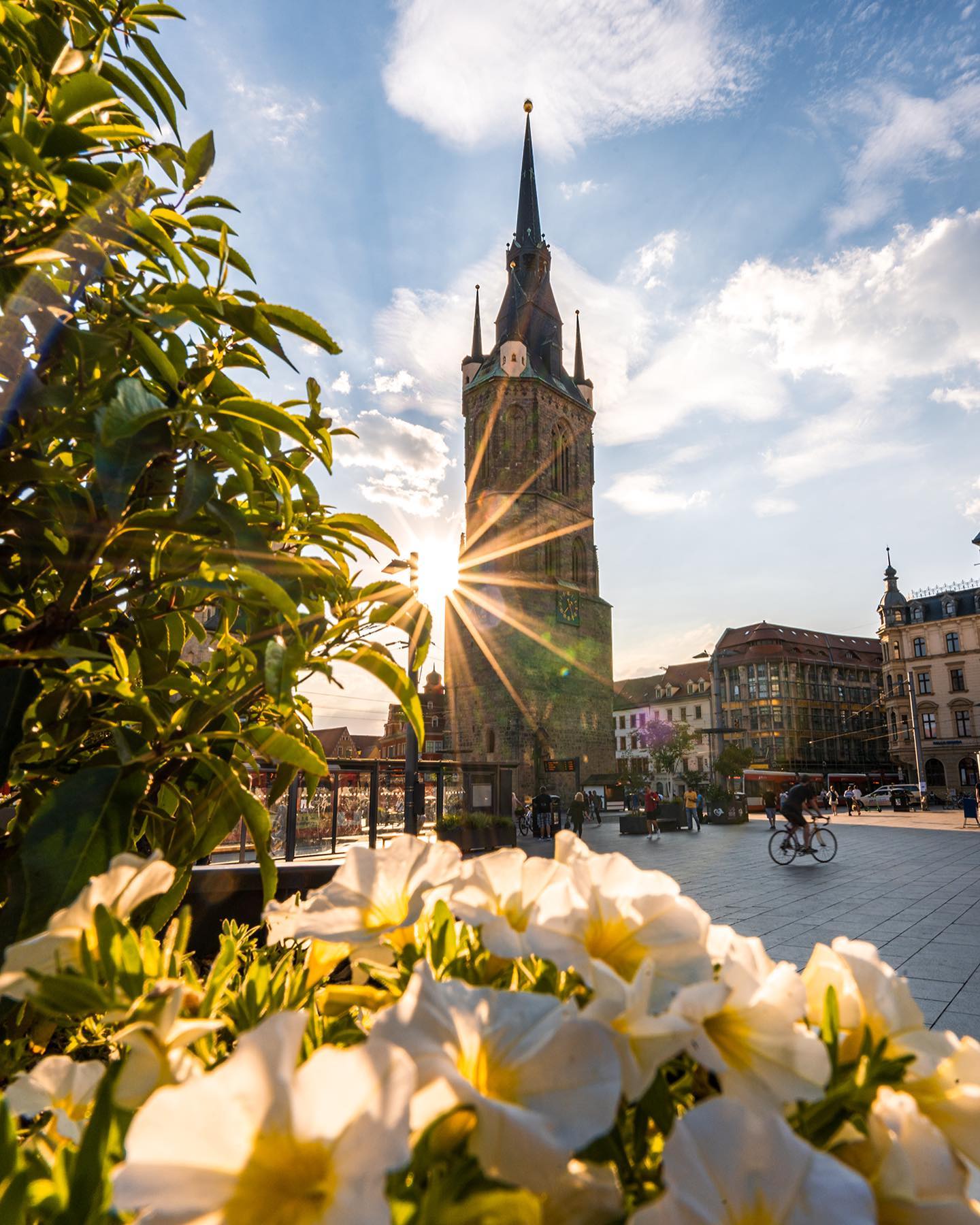
Discover Germany
You're almost there
You will shortly be receiving an email to confirm your subscription. Please remember to click on the verification link so we can authenticate your email address.
We look forward to sending you all the latest news and information about Germany.
You have clicked on the confirmation link. Your registration is now complete. You will now begin to receive our newsletter.
We're sorry to see you go...
You have been unsubscribed from the Destination Germany newsletter. Feel free to continue using our digital channels. We hope to see you again soon!
Your participation has been confirmed.
- Best Extended Auto Warranty
- Best Used Car Warranty
- Best Car Warranty Companies
- CarShield Reviews
- Best Auto Loan Rates
- Average Auto Loan Interest Rates
- Best Auto Refinance Rates
- Bad Credit Auto Loans
- Best Auto Shipping Companies
- How To Ship a Car
- Car Shipping Cost Calculator
- Montway Auto Transport Review
- Best Car Buying Apps
- Best Sites To Sell a Car
- CarMax Review
- Carvana Review (July 2024)
- Best LLC Service
- Best Registered Agent Service
- Best Trademark Service
- Best Online Legal Services
- Best Accounting Software
- Best Receipt Scanner Apps
- Best Free Accounting Software
- Best Online Bookkeeping Services
- Best Mileage Tracker Apps
- Best Business Expense Tracker Apps
- Best CRMs for Small Business
- Best CRM Software
- Best CRM for Real Estate
- Best Marketing CRM
- Best CRM for Sales
- Best SEO Services
- Best Mass Texting Services
- Best Email Marketing Software
- Best SEO Software
- Best HR Software
- Best Payroll Services
- Best Global Payroll Services 2024
- Best Payroll Software for Accountants in 2024
- Best HR Outsourcing Services
- Best HRIS Software
- Best Free Time Tracking Apps
- Best Project Management Software
- Best Construction Project Management Software
- Best Task Management Software
- Free Project Management Software
- Best Personal Loans
- Best Fast Personal Loans
- Best Debt Consolidation Loans
- Best Personal Loans for Fair Credit
- HOME EQUITY
- Best Home Equity Loan Rates
- Best Home Equity Loans
- Best Checking Accounts
- Best Online Checking Accounts
- Best Online Banks
- Bank Account Bonuses
- Best High-Yield Savings Accounts
- Best Savings Accounts
- Average Savings Account Interest Rate
- Money Market Accounts
- Best CD Rates
- Best 3-Month CD Rates
- Best 6-Month CD Rates
- Best 1-Year CD Rates
- Best 5-Year CD Rates
- Best Hearing Aids
- Best OTC Hearing Aids
- Most Affordable Hearing Aids
- Eargo Hearing Aids Review
- Best Medical Alert Systems
- Best Medical Alert Watches
- Best Medical Alert Necklaces
- Are Medical Alert Systems Covered by Insurance?
- Best Online Therapy
- Best Online Therapy Platforms That Take Insurance
- Best Online Psychiatrist Platforms
- BetterHelp Review
- Best Mattress
- Best Mattress for Side Sleepers
- Best Mattress for Back Pain
- Best Adjustable Beds
- Best Home Warranty Companies
- Best Home Appliance Insurance
- American Home Shield Review
- Liberty Home Guard Review
- Best Moving Companies
- Best Interstate Moving Companies
- Best Long-Distance Moving Companies
- Cheap Moving Companies
- Best Window Brands
- Cheap Window Replacement
- Window Replacement Cost
- Best Gutter Guards
- Gutter Installation Costs
- Best Solar Companies
- Best Solar Panels
- How Much Do Solar Panels Cost?
- Solar Calculator
- Texas Electricity Companies
- Texas Electricity Rates
- Best Car Insurance Companies
- Cheapest Car Insurance Companies
- Compare Car Insurance Quotes
- Best Car Insurance for New Drivers
- Best Pet Insurance
- Cheapest Pet Insurance
- Pet Insurance Cost
- Pet Insurance in Texas
- Pet Wellness Plans
- Is Pet Insurance Worth It?
- Best Life Insurance
- Best Term Life Insurance
- Best Whole Life Insurance
- Term vs. Whole Life Insurance
- Best Travel Insurance Companies
- Best Homeowners Insurance Companies
- Best Renters Insurance Companies
- Best Motorcycle Insurance
- Cheapest Homeowners Insurance
- Cheapest Renters Insurance
- Travel Medical Insurance
MarketWatch Guides is a reviews and recommendations team, independent of the MarketWatch newsroom. We might earn a commission from links in this content. Learn More

Travel Insurance for a Germany Vacation (2024)
with our partner, Faye

Alex Carver is a writer and researcher based in Charlotte, N.C. A contributor to major news websites such as Automoblog and USA Today, she’s written content in sectors such as insurance, warranties, shipping, real estate and more.

Tori Addison is an editor who has worked in the digital marketing industry for over five years. Her experience includes communications and marketing work in the nonprofit, governmental and academic sectors. A journalist by trade, she started her career covering politics and news in New York’s Hudson Valley. Her work included coverage of local and state budgets, federal financial regulations and health care legislation.
Here’s a breakdown of how we reviewed and rated the best travel insurance companies
Whether you’re trekking in the Black Forest or sightseeing in Cologne, unforeseen situations can arise during a vacation to Germany. Travel insurance for Germany can protect you against financial losses if unexpected medical treatment, trip cancellations or travel delays hinder your plans.
We at the MarketWatch Guides Team have researched and reviewed the best travel insurance companies to help you navigate coverage, costs, benefits and insurance requirements for your trip to Germany.
Compare Travel Insurance Companies for Germany
Why trust marketwatch guides.
Our editorial team follows a comprehensive methodology for rating and reviewing travel insurance companies. Advertisers have no effect on our rankings.
Companies Reviewed
Quotes Collected
Rating Factors
Do I Need Travel Insurance for Germany?
Germany travel insurance requirements vary based on where you are traveling from and if you need a visa. Travel insurance is optional for U.S. citizens and other travelers who do not require a visa as long as they stay in Germany for less than 90 days. But if you need a visa to enter Germany or the Schengen Area, then travel insurance is mandatory. Visit the Schengen visa website to learn about Germany visa requirements and applications.
If you have to cancel your trip unexpectedly , Germany travel insurance may cover some of your prepaid, nonrefundable expenses. This could include reimbursements for flights, lodging and travel excursions. Generally, travel insurance covers trip cancellations for the following reasons:
- Jury duty or legal obligations
- Death of an immediate family member or travel companion
- Unforeseen medical injury or a serious health condition
- Natural disasters
- Acts of war or terrorism
Travel insurance can also provide emergency medical coverage if you need health care abroad. Germany ranks among the top countries in the world for its high-quality health care system. Tourists will have to pay for treatment out of pocket, and medical costs can add up if your health insurance does not extend overseas. Purchasing a medical travel insurance plan can offer coverage and ensure peace of mind in case you need medical care while vacationing in Germany.
Cancel for Any Reason Coverage
Cancel for any reason , or CFAR, coverage is an optional upgrade to standard travel insurance policies that covers travel cancellations for any given reason. It is a worthwhile investment if you prefer flexibility, but will increase the cost of your premium.
CFAR coverage extends cancellation benefits beyond the reasons covered by your standard policy. Say you’re planning an anniversary trip to Hamburg and booked a nonrefundable hotel, but decide that Munich is a better option. With CFAR insurance, you can submit a claim for reimbursement of the lost lodging costs — simply because you changed your mind.
Although CFAR coverage offers flexibility, it is subject to deductibles, disclaimers and restrictions. Be sure to review coverage exclusions before you purchase this optional insurance.
Gear Theft Protection
Germany is considered a safe country for U.S. citizens to visit. However, as with every major city in Europe, there may be scams, crime and petty theft. If you’re visiting major cities like Berlin or Munich, you may want to consider gear theft protection.
You may want to bring your valuables to Germany, like a camera to photograph the Bavarian Alps or Oktoberfest. Gear theft protection covers you in case your items are lost or stolen. Coverage may include the following valuables:
- Laptop, mobile phone or tablet
- Professional camera
- Camera equipment, including tripods and stabilizers
- Sporting gear and equipment, like ski helmets, ski poles and snowboards
Most travel insurance plans cover valuable items up to a predetermined cost. But gear theft protection may not include coverage for all of your valuables. Review your policy for limitations and exclusions and consider leaving irreplaceable items at home. Medical Emergency Insurance and Emergency Medical Evacuation
If you have a medical emergency in Germany without travel insurance, you can endure a significant financial setback. While standard travel insurance policies provide some coverage, you are not guaranteed full reimbursement for any treatment you receive.
Medical travel insurance can include coverage for the following:
- Hospital expenses
- Operating room fees
- Ambulance costs
- Dental emergencies
- Lab tests and X-rays
Most travel medical insurance plans also provide emergency medical evacuation and repatriation. This coverage protects you from the cost of medical evacuation to your home country if you can’t receive the required health care in Germany.
Like the neighboring countries of Switzerland and Austria, Germany is considered an adventure aficionado’s haven. But keep in mind that travel medical insurance may not extend to extreme sports. However, some companies offer this protection as a policy add-on.
Rental Car Protection
The public transportation system in Germany is modern, well-connected and runs frequently. While public transit offers a budget-friendly, easy way of getting around, some travelers may prefer to rent a car.
Renting a car allows you more freedom to travel at your own pace, but there is more responsibility involved. Germany legally requires all rental cars to have unlimited third-party liability insurance. While this protection is automatically included when you rent a car, it offers minimum coverage.
Travel insurance with rental car protection can cover you if a rental car is damaged. Although the details differ from policy to policy, most premium rental car insurances include the following:
- Collision damage waiver
- Theft protection
- Windshield and tire protection
- Roadside assistance
- Personal effects and injury insurance
Standard travel insurance policies may only include rental vehicle excess to provide coverage if your rental vehicle is damaged or stolen. This protection can help you recoup financial losses if you’re held liable. Other providers may offer varying rental car coverages as add-ons, which increase your premium.
Trip Cancellation Insurance
Most travel insurance coverage includes nonrefundable and prepaid trip expenses up to a predetermined limit. Trip cancellation insurance can protect you from financial loss by reimbursing a canceled flight , hotel or even travel excursions.
Some of the accepted reasons you can file a claim for trip cancellation insurance include:
- Hospitalization
- Serious injury or unforeseen illness
- Death of a family member or travel companion
- Severe weather conditions
- Military orders (including domestic or international terrorism)
How Much Does Germany Travel Insurance Cost?
Whether you’ve decided on a short-term, single trip or an annual multi-trip policy, travel insurance costs can vary depending on many factors. Coverage costs largely depend on your personal preferences, destination and other travel plans.
To receive an insurance quote, you will need to provide the following information:
- Number of travelers
- Destination country and city
- Country of residence
- Trip length
- Total trip price
To determine the total trip price, factor in flights, accommodation and all nonrefundable and prepaid expenses. Many cheap travel insurance options are available if you are on a budget.
We requested quotes from ten travel insurance companies for their most affordable plan for a trip to Germany. The below quotes are for a 30-year-old traveler from Florida, traveling to Germany for ten days in September 2024, with a total trip cost of $4,000. Policies include coverage for cancellations, interruptions, delays, medical care and evacuation.
These quotes were collected in April 2024 for a trip in September 2024.
Although policies differ between each insurance company, the above quotes can help you determine the cost of travel insurance . Each plan includes the following coverage:
- COVID-19 Cancellation
- COVID-19 Medical
- Trip cancellation
- Trip interruption
- Medical evacuation
- Medical costs
How Do I Get Travel Insurance for Germany?
Before planning your vacation to Germany, see what coverage you already have. Contact your current health insurance provider to see if your coverage extends abroad. Some credit card companies include travel health insurance and trip protection, and you can typically purchase flight insurance when booking with an airline.
If you want to purchase travel insurance for your trip to Germany, make sure to compare various plans and policies. We recommend you request quotes from at least three companies before deciding which travel insurance plan is best for you. Consider factors like pre-existing medical conditions and the activities you want to include in your itinerary. Review each policy in detail for exclusions and deductibles before purchasing.
Germany Safety Tips
Germany is considered safe and has low crime rates, but crime can still occur. Before you jet off on your German vacation, here are some safety tips to keep in mind.
Crime and Safety
Germany ranks high for safety in the Global Peace Index (GPI) and crime rates are low by global standards. However, there are recorded scams, petty theft and crime in major cities. Pickpocketing is an issue in Berlin and Munich, so practice general precautions when visiting.
Day Trips, Tours and Excursions
From learning about the history of Hamburg to exploring the Black Forest, Germany is home to many day trip destinations. You can also take a day trip to other European Union member states like Switzerland or Austria. Travel insurance can provide coverage for certain excursions and related costs, including gear rental if you are planning to golf.
Germany has lifted all COVID-19 restrictions as of February 2023. You will no longer be required to present a vaccination passport or negative PCR test if you are entering the Schengen Area. There are also no coronavirus restrictions on German public transport.
Consider a travel insurance policy with extended COVID-19 coverage if you worry the virus could interfere when you visit Germany.

Is Travel Insurance for a Germany Vacation Worth It?
If you have a U.S. passport, you do not need travel insurance to enter Germany, but purchasing an insurance policy can be worth it depending on several factors.
Travel insurance can protect you from financial loss if unexpected circumstances arise, like unexpected flight delays or cancellations, lost baggage and medical emergencies. Purchasing a policy to cover medical costs, trip cancellations and more can provide peace of mind so you can focus on enjoying your vacation.
Frequently Asked Questions About Travel Insurance in Germany
Can i claim flight compensation if my trip to germany gets canceled.
Unless you have travel insurance, refunds for canceled or delayed flights are subject to the airline and not always guaranteed. But purchasing travel insurance can add protection from financial loss if your flight is canceled due to a covered reason.
What type of travel insurance do I need for Germany?
The best travel insurance for you will depend on your personal preferences and coverage needs. If you are concerned about emergency medical events, look into travel insurance plans that offer comprehensive health coverage. Or seek a policy with extended trip cancellation and delay coverage if travel interruptions are your main concern.
Do I need travel insurance with a German visa?
If you are a U.S. citizen, you do not need to fill out a visa application if you plan to visit Germany for less than 90 days. Otherwise, you will need a visa , which mandates you have travel insurance to enter the country.
Is German health care free for visitors?
German public health care is only accessible to residents of the country. Visitors have to pay for treatment upfront. You claim reimbursement later on if your health care offers coverage abroad or you have travel medical insurance. Temporary visitors from other Schengen countries can use their European Health Insurance Card (EHIC) for emergency medical treatment.
If you have feedback or questions about this article, please email the MarketWatch Guides team at editors@marketwatchguides. com .

MarketWatch Guides may receive compensation from companies that appear on this page. The compensation may impact how, where and in what order products appear, but it does not influence the recommendations the editorial team provides. Not all companies, products, or offers were reviewed.

IMAGES
COMMENTS
Tourism in Germany continues to grow. The Tourism Satellite Account shows the sector directly generated over EUR 105 billion in the German economy, or 3.9% of total GVA in 2015. ... The Federal Minister for Economic Affairs and Energy has lead responsibility for tourism policy, and is supported by the Advisory Council on Tourism Issues which ...
An effective and future-proof tourism policy needs to coordi-nate and link up the efforts of all stakeholders at national level, federal state level and within the sector itself. ... work to promote inbound tourism to Germany has made sustain-ability - that complex balancing act between the interests of the environment, the economy and ...
Just as the sector was starting to rebound, the economic fallout from Russia's aggression against Ukraine has dealt a fresh blow to recovery prospects. The 2022 edition of OECD Tourism Trends and Policies analyses tourism performance and policy trends to support recovery across 50 OECD countries and partner economies. It examines the key ...
Germany Tourism policy. Central . Limited legal role, covering contract law, tax policy, labour market policy and SME policy in relation to the tourism sector; Practically, due to the relationship between tourism and the other fields with federal competences which have to be taken into account, the position of the federal government plays an ...
The 2.5 per cent increase in inbound tourism in 2019 confirms that Germany is continuing to benefit from the sustained growth in European and global tourism. It also consolidates Destination Germany's strong position in the international tourism market. RECORD RESULT IN A ROW (provisional figures, Federal Statistical Office, 10 February 2020) 3
BMWK - Bundesministerium für Wirtschaft und Klimaschutz
The German National Tourist Board (GNTB) is Germany's national tourism organisation. It works on behalf of the Federal Ministry for Economic Affairs and Energy (BMWi) to represent Germany as a tourist destination and is funded by the Ministry in accordance with a decision taken by the German Bundestag. Working closely with the German travel ...
BoardDear reader,Global tourism, and thus Germany's inbound tourism industry, faced new. hallenges in 2022.The pandemic-related restrictions on travel were grad-ually lifted in many countries, and this new freedom to travel coincided with a great desire among consumers to make up for cancelled o.
Tourism in Germany. Germany is the eighth-most-visited country in the world, [ 1 ][ 2 ] with a total of 407.26 million overnights during 2012. [ 3 ] This number includes 68.83 million nights by foreign visitors, the majority of foreign tourists in 2009 coming from the Netherlands, the United Kingdom, and Switzerland (see table).
Travel & Tourism contributes one in eight jobs International visitor spend up more than 60% . London, UK: The World Travel & Tourism Council's 2023 Economic Impact Research (EIR) today reveals Germany's Travel & Tourism sector is recovering at pace to recover to within 95% of pre-pandemic levels. The sector is set to contribute €355BN to the national economy this year, getting to within ...
ByIain Rogers. June 13, 2023 at 4:39 AM EDT. Save. Germany's tourism industry is showing signs of shaking off the legacy of the Covid-19 pandemic, bolstered by a strong revival in domestic ...
Info. All COVID‑19 entry restrictions to Germany are lifted for the time being. Entry to Germany is permitted for all travel purposes (including tourism and visits). It is no longer necessary to present proof of vaccination, proof of recovery or a negative test result for entry to Germany. Please see here for further information on travel ...
Travelling by train in Germany is very convenient, too: the local and long-distance public transport network has trains and buses that serve virtually the entire country. The major cities and their surrounding areas in particular offer excellent transportation links. One convenient option for travel between larger towns and cities is that of ...
The report highlights key tourism policy developments, focuses on issues that rank high on the policy agenda in the field of tourism and provides a broad overview and interpretation of tourism trends in the OECD area and beyond. ... Tourism is one of Germany's most prosperous and lucrative economic sectors, generating close to EUR 100 billion ...
Travel and tourism are critical drivers of economic growth and employment in the United States, accounting for nearly 3% of U.S. gross domestic product (GDP). With one domestic job stemming from every 69 international visits to the U.S., and 9.9 million American jobs paying more than $322 billion in employee compensation, approximately 1 in ...
They also attack places of worship, parks, and major sporting and cultural events. They target schools, airports, and other public areas. Be aware of your surroundings when traveling to tourist locations and crowded public venues. Monitor local media for breaking events and adjust your plans based on new information.
Press release: Record-breaking figures for incoming tourism in June, and significant overall growth in the first six months of 2024. Additional boost for inbound tourism due to UEFA EURO 2024 - Top ranking for Germany in the Travel & Tourism Development Index 2024 - Positive outlook for the second half of 2024 Frankfurt am Main, 9 August 2024 ...
Travel Advisory. May 1, 2024. Germany - Level 2: Exercise Increased Caution. T. Reissued after periodic review with minor edits. Exercise increased caution in Germany due to terrorism. Country Summary: Terrorist groups keep planning attacks in Germany. Terrorists may attack with little or no warning.
Just as the sector was starting to rebound, the economic fallout from Russia's aggression against Ukraine has dealt a fresh blow to recovery prospects. The 2022 edition of OECD Tourism Trends and Policies analyses tourism performance and policy trends to support recovery across 50 OECD countries and partner economies. It examines the key ...
Winter travel in Germany can be cold but beautiful. One of my favorite times of year to travel in Germany is during the four weeks of advent at Christmas. Yes, it gets dark early (by 5pm or a bit earlier) but the lights, decorations, and Christmas markets more than make up for it. Plus, you can go skiing and enjoy other winter activities.
Germany Tourism: Evolution, Structures, Challenges and Perspectives was published in European Tourism Planning and Organisation Systems on page 198. ... Tourism Policy in Lithuania: Management of Permanent Transition. 11. Tourism in Romania: From Centralised to Private Initiative, a Growth Path. Part 3: Central Europe.
Bauhaus: follow in the footsteps of this world-famous art school. Harz: Person goes white-water kayaking on the river Oker. Aerial view of the Dauner Maar in the Volcanic Eifel. Seebach: Hiking group with a wheelchair user and a man with a prosthetic leg on the Black Forest High Road.
Consider a travel insurance policy with extended COVID-19 coverage if you worry the virus could interfere when you visit Germany. Our Top Pick Best 'cancel for any reason' coverage